Quarterly Journal of The Association for Petroleum Acts Administration
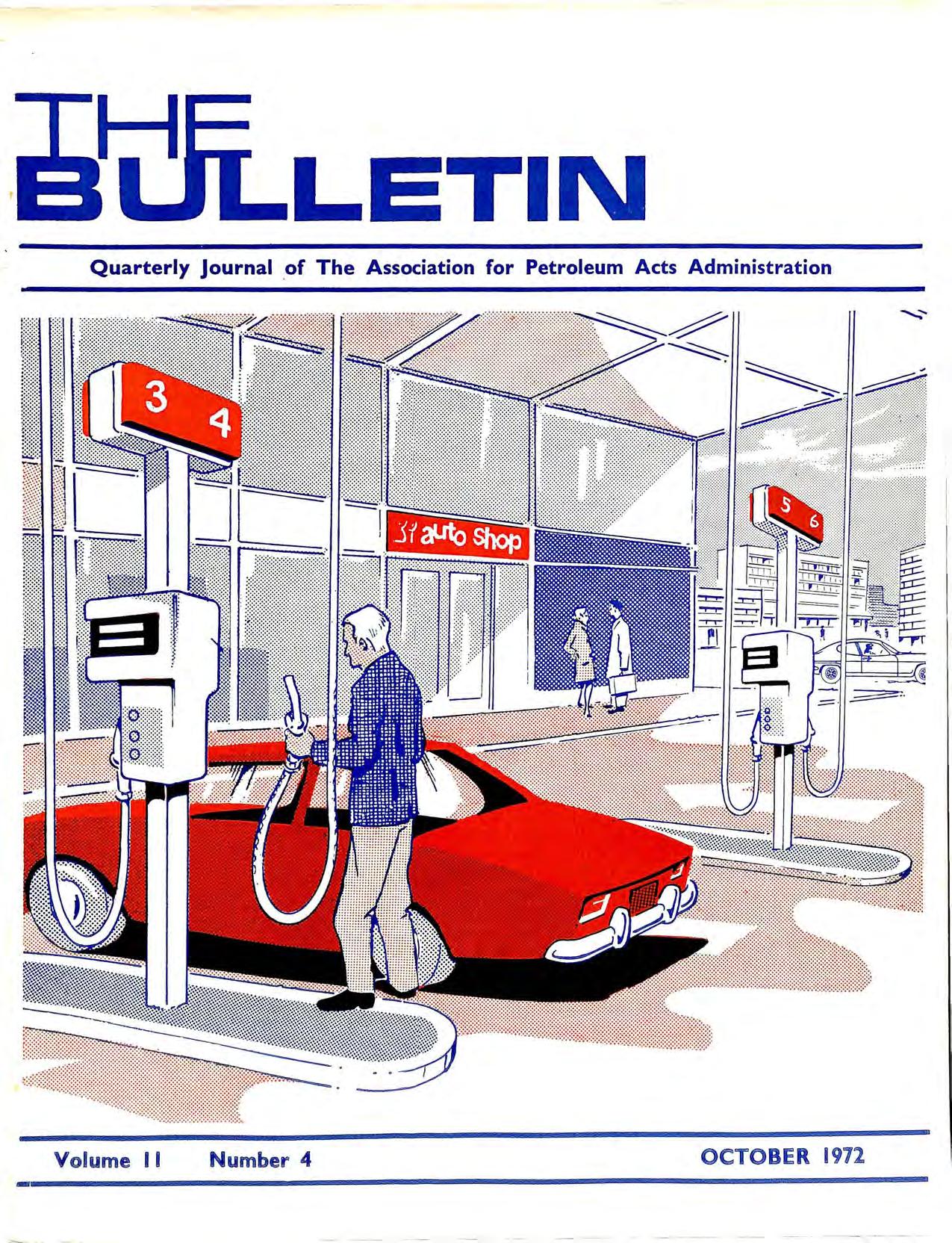
Volume 11 Number 4 OCTOBER 1972 ----------------------------------------------------------------------
_LETIN
E.V.BEEBY
J. BEER
J. BENNETT
J. BIRKS
P. H. CARTWRIGHT D. HALL S. W. D. HARRIS G. H. HARVEY
W. HETHERINGTON
THE ASSOCIATION FOR PETROLEUM ACTS ADMINISTRATION
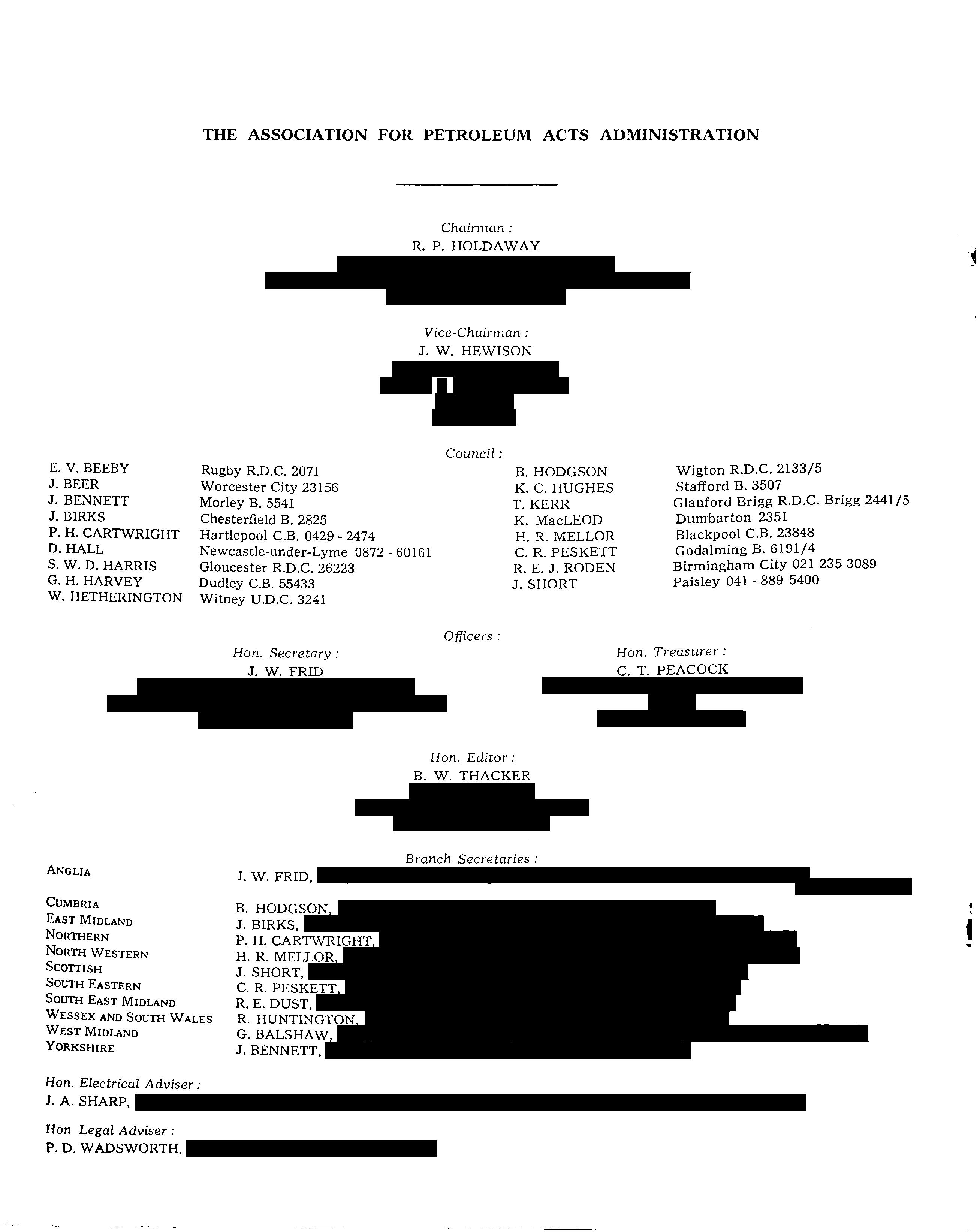
Chairman: R P. HOLDAWAY
Vice-Chairman: J. W. HEWISON
Council :
Rugby RD.C. 2071 Worcester City 23156 Morley B. 5541 Chesterfield B. 2825
B. HODGSON K. C. HUGHES
T.KERR
Wigton RD.C. 2133/5
Stafford B. 3507
ANGLIA
CUMBRIA
EAST MIDLAND
NORTHERN
NORTH WESTERN
SCOTTISH
SOUTH EASTERN
SOUTH EAST MIDLAND
WEST MIDLAND YORKSHIRE
Hon. Electrical Adviser:
J. A. SHARP,
Hon Legal Adviser: P. D. WADSWORTH,
Hartlepool C.B. 0429 2474 Newcastle-under-Lyme 0872 60161 Gloucester RD.C. 26223
K. MacLEOD H. R MELLOR C. R PESKETT R E. J. RODEN J. SHORT Dudley C.B. 55433 Witney U.D.C. 3241
Officers:
Hon. Secretary:
Glanford Brigg RD.C. Brigg 2441/5 Dumbarton 2351
Blackpool C.B. 23848
Godalming B. 6191/4 Birmingham City 021 235 3089 Paisley 041 889 5400
Hon. Treasurer: J. W. FRID C.T. PEACOCK
WESSEX AND SOUTH WALES
Hon. Editor: B. W. THACKER Branch Secretaries: J. W. FRID, B. HODGSON, J. BIRKS, P. H. CARTWRIGHT, H. R MELLOR, J. SHORT, C. R. PESKETT, R. E. DUST, R. HUNTINGTON, G. BALSHAW, J. BENNETT,
t
.
Talking Point
The Reason Why?
Referring to the number of accidents involving petroleum, the repart of H.M. Inspectors of Expl'osives says that although the total number of those injured and killed was cons'iderably less than the comparable average over the last ten years, one should not try to draw any 'conclusion from this.
The report does, however, suggest that perhaps there is an increasing awareness an the part of the public of the dangers attendant upon careless handling of petroleum.
If there is an increase in awareness, might not one of the reasons be that there is in existance an organisation such as ours which looks 'close'ly at safe handling and storage of petroleum spirit?

, I VOLUME 11 NUMBER 4 OCTOBER, 1972 Contents Talking Point Notes and News Letters Underground Tanks Electronic Self-Service Chairman's Address , The Bulletin
Published quarterly by the Association for Petroleum Acts Administration Opinions expressed in this Journal are
necessarily the views of the Association 65 66 67 68 69 69
Subscription: £1.50 per annum
not
Forecourt Pumping Equipment 70
Council Meeting Branch Reports Legal Proceedings Emergency Procedures Subject Index Annual Index 72 75 79 81 82 83
Thacker
Editor: B. W. C.
65
notes and news
NEW MEMBER
St. Neots RD.C. Hunts. H. & S
Associate Members
A. D Higgs, Esq., '
D. B. Holloway, Esq.,
D. W. Inman, Esq.,
APPOINTMENTS
J. Donnelly has been promoted Chief Inspector of Weights and Measures, Kilmarnock.
J. F. Flynn, Deputy Chief Fire Officer, Wolverhampton, has been appointed Chief Fire Officer.
H. B. Greenborough, Chief Executive of Shell Mex and B.P. Ltd., is to be Pr!;sident of the Oil Industries Club for the year commencing 1st January, 1973. He succeeds Mr. Norman Leslie, Chairman of Petrofina (U.K.) Ltd.
K. Horan, Deputy Chief Fire Officer, Yorkshire-West Riding, has been appointed Chief Fire Officer
L. Johnson, Deputy Chief Fire Officer, Somerset, has been appointed Chief Fire Officer
L. Schofield, Deputy Chief Public Health Inspector, Wellingborough RD.C. , has been appointed Chief Public Health Inspector.
RETIREMENTS
A. Bullion, Chief Fire Officer, Somerset.
G. Cowles, Chief Public Health Inspector, Wellingborough RD.C. after 36 ye ars in this post.
S. G. Keely, Chief Fire Officer, Wolverhampton, after 37 ye ars service.
PUBLICATIO N
SI. 1972-91 7
Highl y Flamma ble Liquids and Liquefied Petroleum Gases Reg ula t ions 16p
Secretary's Notes
The Annual General Meeting and Conference of the Association will be held at Hastings on Wednesday and Thursday, 4th and 5th April, 1973. A full conference programme will be arranged, with papers by three speakers, one of whom will be J. E. Bolton, Esq., D.M.A., Clerk of the BarroWupon-Soar R.D.C., whose talk will be on 'Local Government Re-Organisation'
A Mayoral Reception with entertainment will be accorded to delegates on the Wednesday evening.
The purpose of this advance notification is to give members notice in good time to obtain their Authority's approval to attend. It is hoped that as many delegates as possible will be accompanied by their wives (ladies).
H.M. Inspectors of Explosives Report
(August 1972--H.M.S.O. 87p)
"Spillages of petroleum spirit .are hazardous in any circumstances, but those which occur when road tankers overturn can have disastrous results" warns the annual report for 1971 of H.M. Inspectors of Explosives
"Even if no fire occurs " , the report continues, ":the spillage of several thousand gallons of inflammable liquid onto a road and into neighbouring ditches requires very prompt action, both by the Police in diverting traffic and warning those in the area to put out all naked lights, and by the Fire Brigade in dispersing the spilled liquid. If the spillage should ignite there is the additional risk that the fire may spread to neighbouring properties and that the compartments of ,the tank wagon may explode
The report states that during 1971 four cases were reported in which pE troleum attendants received burns when clothing which had become splashed with petroleum during vehicle refueling wa:s igni1ted by either a naked flame or an ex posed electric fire element in the filling station kiosk. H.M. Inspectors of Explosives are seeking the co-operation of Local Authorities to ensure that licensees warn all pump attendants of the dangers arising from petrol soaked clothing and take steps to remo v e from kiosks all poss ible Sources of ignition.
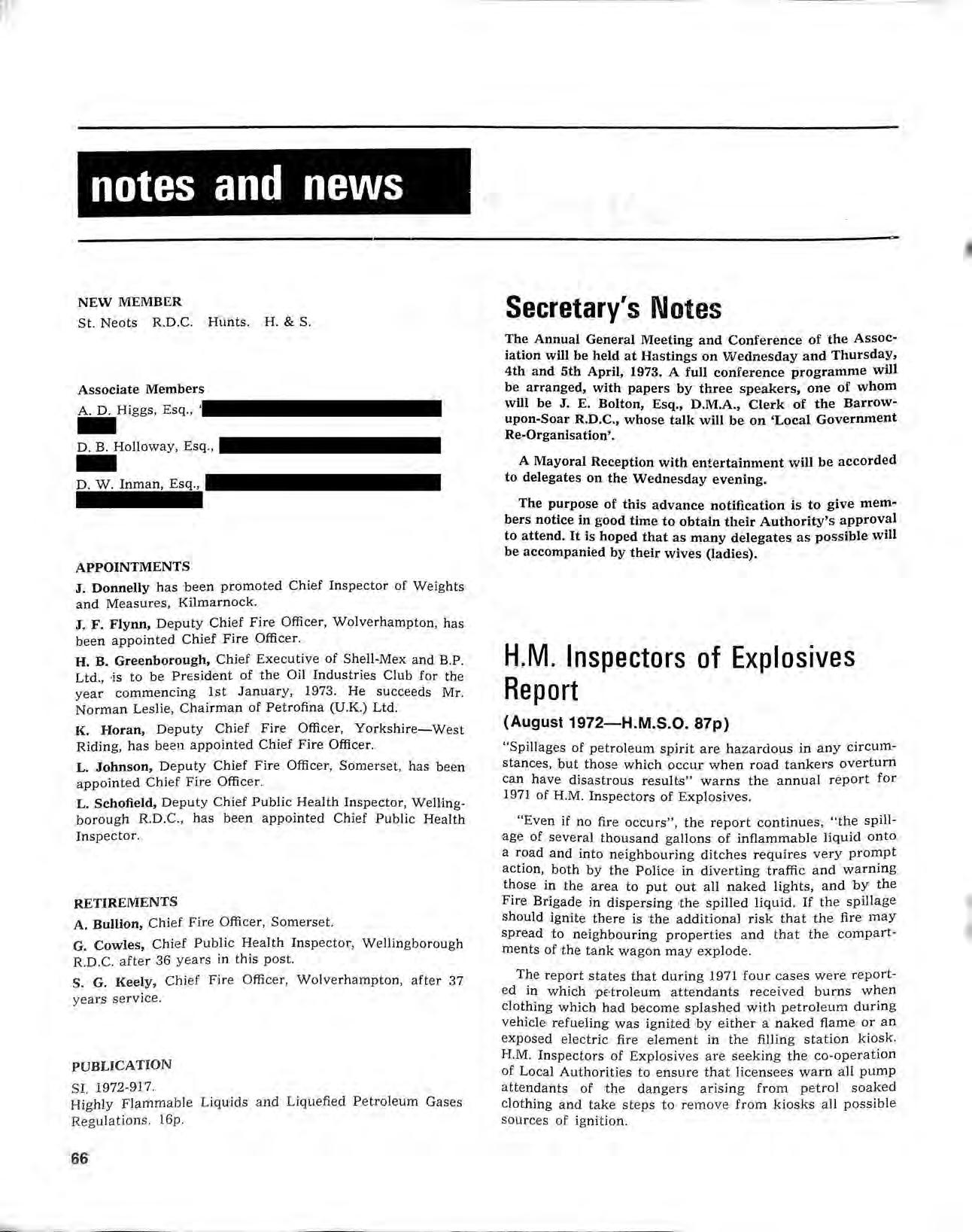
I
66
Courageous Action
Mr. H. B. Greenborough, Chief Executive and Managing Director of Shell-Mex andB.P. , has personally commended seven members of the company's Operations staff for 'most courageous action' whilst pumping out petrol storage tanks -in a collapsing building.
The incident took place in PollokshawRoad, Glasgow, when subsidence of a disused underground railway opened a 20 foot wide hole in the road threatening to engulf a garage and fracture tanks containing 5,000 gallons of petrol.
A team led by Mr. Rey Goudie, Operations Manager, Shell and BP Scotland, drove a Reiver and 'a Highwayman road
tanker partly into the garage Despite the progressive disintegration of the building and heavy vaporisation of the stored motor spirit, the six tanks were pumped dry, the whole operation taking three hours
Members of the team were John Dixon (Supervisor, Bishopbriggs Terminal), Bob Gordon Operator, Abbotsinch), and Frank Hamill, Alex Mitchell, Charlie Weir and Bill Lees (Drivers, Bishopbriggs).
As an expression of the Group's appreciation, each man is to receive a gift which will be presented at a dinner to which representatives of Glasgow public services have been invited.
letters
SELF-SERVICE
I wonder if I might be allowed to reply to a letter in the July issue of the Bulletin in which the writer expresses his delight that from a safety point of view I have no fauIt to find with unattended s elf-service I have read and re-read my earlier letter, but can find no 'Such statement in it. It is true that I know of no fires occurring on unattended sites but then neither do I know of any fires involving gold-plated pumps, for much the same reason there are not many of them about. Hone takes the total number of petrol pumps in the country, ,the number of fires occurring at pumps,and the total number of unattended self-service pumps, then even allowing for the greater risk with unattended pumps, I suggest .that statistically speaking, we are due for a fire at an unattended pump ,the century after next.

The real harm done by the acceptance of unattended selfservice is ,that it raises understandable doubts in the minds of the publk, of fiiHng station staff, and of petroleum officers, as to the value or need of certain ..standard licence conditions, and this is bound to affect their approach to all licence conditions. We recently had a case on a controlled self-service site where the console operator prevented a customer f rom filling an unlabelled vessel, whereupon he wall abused and threatened, 'and told that these rules were for members of the ,staff, not ,the public This was of course wrong, but the legal position is by no means clear with sites, and the customer probably had this in mmd As for the attendant, who can blame him if he lets it go next time, asking why should he subject himself ,to 'abuse When ,the cus'tomer can do just as he likes at ,the unattended ,site down the road?
I would not only dispute Mr Nap's statement that I have now joined the ranks of the Home Office, the AP AA and the G.L.C. who support unattended self-service, I would suggest that his choice of ,words is extravagant, and t hat instead of "support", "suffer" would be more a pt. I yet to find a petroleum officer, or indeed a fllhng-statlOn operator who is wildly enthusiastic about note-acceptors and pre-payment pumps' the enthusiasm comes from , h d bt existmg m the the oil companies Some idea of t e ou s . minds of local authorities can be gained from readl?g account of the Northern Branch Meeting, reported I? ,t e same issue of the Bulletin. As for the Home Office'Ilfhthe '1 f ' ts ort" how is it ' ave 01 companies are so sure 0 'I supp , yet to read of appeals under Section 3 of the Petroleum against those authorities which do not allow unatten e self-service?
f S W 1 is? He is
Fmally, I wonder who Mr. Nap 0 ' .' certainly not the petroleum officer for that distriCt. Quite obviously he is a man of some resource , as when he of petrol he happened to be in a remote country there happened to be no conventional source of y nearby,and there happened to be an unattend.ed ,self-serv.lce pump nearby. All of which disproves my allegatIOn that having used the plight of .the motorist on the roads as an argument in favour of unattended s'ltes, ,OIl companies then concentrated on centres of populatIOn where there were likely to be bigger financial returns. Or does it?
Burgess Hill . J R. DOMONEY
67
UNDERGROUND TANK MOVEMENT
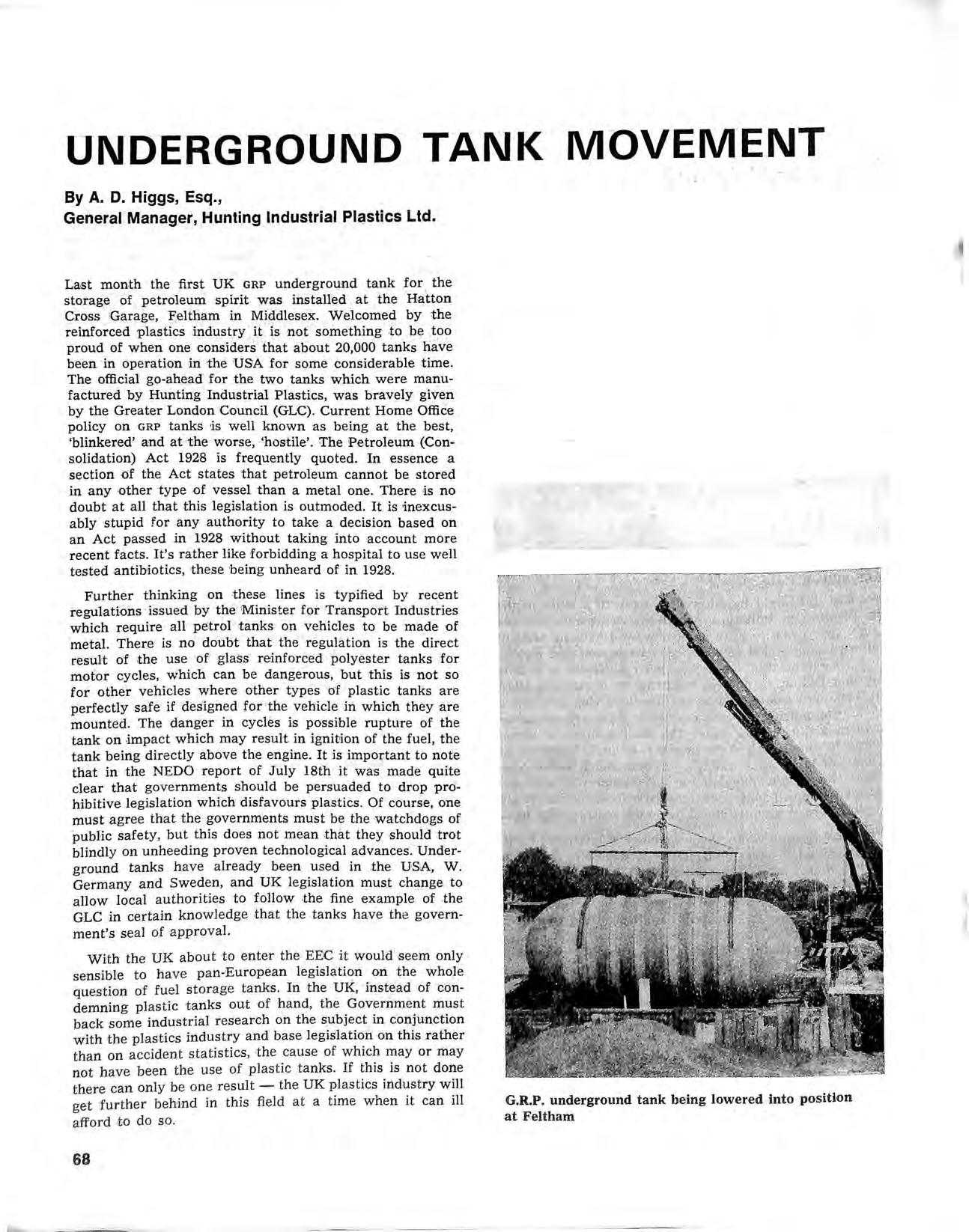 By A. D. Higgs, Esq., General Manager, Hunting Industrial Plastics Ltd.
By A. D. Higgs, Esq., General Manager, Hunting Industrial Plastics Ltd.
La.st month the first UK GRP underground tank for the storage of " petroleum spirit was installed at the Hatton Cross Garage, Feltham in Middlesex. Welcomed by the reinforced p"lastics industry it is not something ' to be too proud of when one considers that about 20,000 tanks have been "in operation in the USA for some considerable time. The official go-ahead for the two tanks which were manufactured by Hunting Industrial Plastics, was bravely g"iven by the Greater London Council (GLC). Current Home Office policy on GRP tanks -is well known as being at the best, 'blinkered' and at the worse, 'hostile'. The Petroleum (Consolidation) Act 1928 is frequently quoted. 'In essence a section of the Act states that petroleum cannot be stored in any other type of vessel than a metal one. There is no doubt at all that this legislation is outmoded. It is inexcusably stupid for any authority to take a decision based on an Act passed in 1928 without taking into "account more recent facts. It's rather like forbidding a hospital to use well tested antibiotics, these being unheard of in 1928.
Further thinking on these lines is typified by recent regulations "issued by the Minister for Transport Industries which require all petrol ' tanks on vehicles to be made of "metal. There is no doubt that the regulation is the direct result of the use of glass reinforced polyester tanks for motor cycles, which can be dangerous, but this is not so for other vehicles where other types 'of plastic tanks are perfectly safe if designed for the vehicle in which they are mounted. The danger in cycles is possible rupture of the tank on impact which may resuit in igniti on of the fuel , the tank being directly above the engine. It is important to note that in the NEDO report of July 18th it was made quite clear that governments should be persuaded to drop pro hibitive legislation which disfavours plastics Of course, one must agree that the governments must be the watchdogs of public safety, but this does not mean that they should trot blindly on unheeding proven technological advances. Underground tanks have already been used in the USA, W Germany and Sweden, and UK legislation must change to allow local authorities to follow .the fine example of ,the GLC in certain knowledge that the tanks have the government's seal of approval.
With the UK about to enter the EEC it would seem only sensible to have pan-European legislation on the whole question of fuel storage tanks In the UK, instead of condemning plastiC tanks out ·of hand, the Government must back some industrial research on the subject in conjunction with t he plastics industry and base legislation on this rather than on accident statistics, ·the cause of w hich mayor may not have been the use of plastic tanks . If this is not done there can only be one result the UK plastics industry will get further behind in this field at a time when it can .jj) afford to do so.
68
G.R.P. underground tank being lowered into position at Feltham
ELECTRONIC SELF-SERVICE
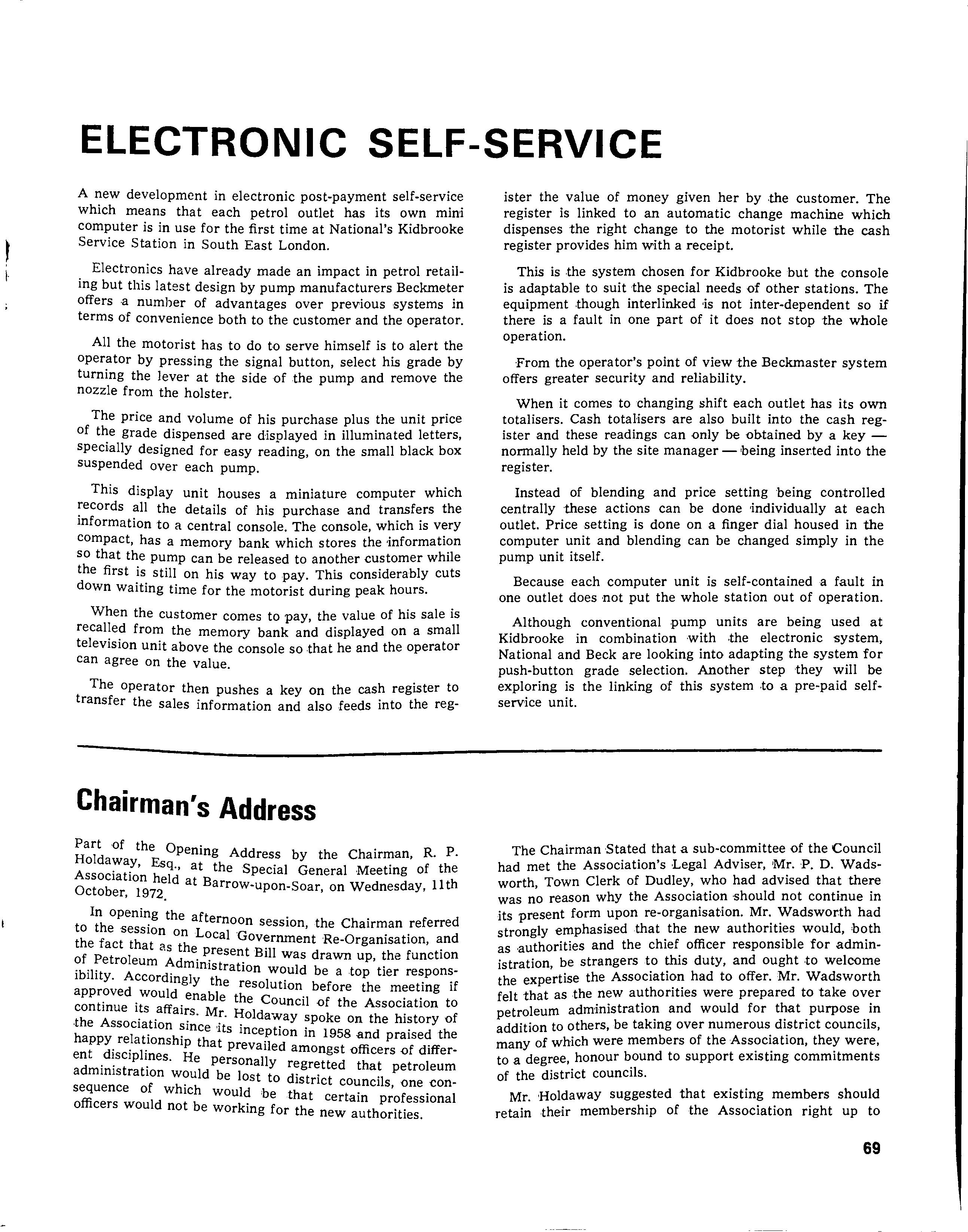
A new development in electronic post-payment self-service which means that each petrol outlet has its own mini computer is in use for the first time at National's Kidbrooke Service Station in South East London.
Electronics have already made an impact in petrol retailing but this latest design by pump manufacturers Beckmeter offers a numher of advantages over previous systems in terms of convenience both to the customer and the operator.
All the motorist has to do to serve himself is to alert the operator by pressing the signal button, select his grade by turning the lever at the side ·of the pump and remove the nozzle from the holster.
The price and volume of his purchase plus the unit price of the grade dispensed are disolayed in illuminated letters, specially designed for easy reading, on the small black box suspended over each pump.
This display unit houses a miniature computer which all the details of his purchase and transfers the mformation to a central console. The console, which is very compact, has a memory bank which stores the 'information so that the pump can be released to another customer while the first is still on his way to pay. This considerably cuts down waiting time for the motorist during peak hours.
When the customer comes to pay, the value of his sale is recalled from the memory bank and displayed on a small television unit above the console so that he and the operator can agree on the value.
The operator then pushes a key on the cash register to transfer the sales information and also feeds into the reg-
ister the value of money given her by the customer. The register is linked to an automatic change machine which dispenses the right change to the motorist while the cash register provides him with a receipt.
This is .the system chosen for Kidbrooke but the console is adaptable to suit the special needs of other stations. The equipment .though interlinked ,is not inter-dependent so if there is a fault in one part of it does not stop the whole operation.
From the operator's point of view the Beckmaster system offers greater security and reliability.
When it comes to changing shift each outlet has its own totalisers. Cash totaHsers are also built into the cash register and these readings can only be obtained by a key normally held by the site manager heing inserted into the register.
Instead of blending and price setting being controlled centrally these actions can be done individually at each outlet. Price setting is done on a finger dial housed in the computer unit and blending can be changed simply in the pump unit itself.
Because each computer unit is self-contained a fault in one outlet does not put the whole station out of operation.
Although conventional pump units are being used at Kidbrooke in combination ·with ,the electronic system, National and Beck are looking into adapting the system for push-button grade selection. Another step they will be exploring is the linking of this system to a pre-paid selfservice unit.
Chairman's Address
Part of the 0 . Hold penmg Address by the Chairman, R. P. at the Special General Meeting of the October, at Barrow-upon-Soar, on Wednesday, 11th
In opening the aft to the s' ernoon seSSIOn, the Chairman referred eSSlOn on Local 'G . d the fact that h overnment Re-OrganisatIOn, an of Petroleum was drawn up, the function 'b'!'t A . mlstratlOn would be a top tier responsI I I y. d ccordmgly the resolution before the meeting if approve would enable th c continue its aff' M e ouncil of the Association to .the Associa' spoke on the history of happy 'Its mce?tion in 1958 and praised the t d' I' p that prevaJied amongst officers of differen ISCIP mes He personall administration Id b Y regretted that petroleum wou e lost to district councils one consequence of which would h h ' ffi e t at certain professional o cers would not be working for the new authorities.
The Chairman ·Stated that a sub-committee of the Council had met the Association's Legal Adviser, Mr.P. D. Wadsworth, Town Clerk of Dudley, who had advised that there was no reason why the Association should not continue in its present form upon re-organisation. Mr. Wadsworth had strongly emphasised that the new authorities would, both as ·authorities and the chief officer responsible for administration, be strangers to this duty, and ought .to welcome the expertise the Association had to offer. Mr. Wadsworth felt that as the new authorities were prepared to take over petroleum administration and would for that purpose in addition to others, be taking over numerous district councils, many of which were members of the Association, they were, to a degree, honour bound to support existing commitments of the district councils.
Mr. Holdaway suggested that existing members should retain their membership of the Association right up to
69
vesting day. He informed the meeting that in due course, when information was available as to which department of the new authorities would be responsible for the enforcement of the Petroleum Act, correspondence would be directed to the Clerk of the Council and the appropriate chief officer of the department concerned, inviting that authority into membership. He expressed the view that the most likely department to administer this responsibility would be either the Fire Service or Trading Standards Service. In the absence of any directive from 'higher up', the new ,authorities would make their own decision; he personally hoped that in the light .of the success of the mixture of professional officers, this might finish ona 50/50 basis.
The Chairman, on behalf of the Council, then put forward the following resolution to the meeting :-
That this Special General Meeting is of the opinion that it is essential that the affairs of the Association for Petroleum Acts Administration be continued in such a manner that a strong and viable organisation will be available, capable of functioning in some form after Local Government Re-Organisation is complete, and, therefore, instructs the Council of the Association to .take all necessary steps to this end.
Mr. Hall in seconding, emphasised the liaison the Association now had with the Home Office (Explosives Branch) and the Institute of Petroleum ·and said this position had been built up slowly over the years and ought not to be discarded lightly.
The Chairman then informed members that the matter was open for discussion.
NEW CONCEPT IN FORECOURT PUMPING EQUIPMENT
By O. B. RANKIN, Esq., C.Eng., A.M.I.Mar.E., Tokheim Corp., U.K. Division.
Over the past nine to ten years we have seen a considerable change in forecourt equipment, especially with the advent of blenders and self-service introduced in <this country in 1963 and the electronically controlled blenders with digital readouts in 1970. However, the basic pumping unit during this decade did not change and in fact remains a relatively mediaeval and cumbersome piece of equipment.
We are now pleased to advise that our recently introduced submerged pump offers a completely new system for pumping and metering fuel and its introduction to this country is possibly the one significant major change t.o affect forecourt equipment and the many permutations of associated self-service gear.
Basically, our model 550-34 submerged pump is an electrically driven centrifugal type having three impellors all of which is fitted inside the underground storage tank and the combined motor and pumping unit is located at the the bottom of the tank completely immersed in the fuel it is pumping. The i H.P. motor is single phase, 50 cycle, 240 volt continuously rated, having a thermal overload built in to the stator windings. The electric motor and pump 'are both cooled internally and externally by the petrol or diesel surrounding them, therefore, their construction has to conform <to the very demanding specification of the Flameproof Authorities, not only in this country, but on the continent and in America where they are widely used. The impelIor and rotor spin at approximately 3,000 revs per minute and the thermal overload, which protects the stator winding from overload and temperature rise, has a resetting time delay for added safety.
Coupled to the motor and pumping unit and fitted externally to the tank is an air separator manifold, siphoning connection, discharge manifold, back pressure and relief valves.
To give some form of mental picture .of the unit, it is approximately 12 feet long, the top section is approximately 12" in diameter by 6" deep and this is connected by concentric piping to the lower section, housing the mot.or and pump and this section is 'approximately 4" in diameter by 18" long.
Some of the more obvious advantages of the submerged pumps when compared to the suction type of dispensing pump are as follows. They have only two moving parts, the pump rotor and impellor and the non-return check valve. Their useful life expectancy, therefore, is as good as the tank itself and this is exceptional for modern day standards. They can considerably reduce -installation costs, maintenance costs and running costs, for example a garage with six blending pumps of the conventional type would have twelve ! RP. motors, twelve pumping units and air separators, twelve vee belts, twenty four pulleys, innumerable by-pass valves, check valves, relief valves, etc., not to mention the six sets of associated pipe work from the pumps to the underground tanks. A similar installation using submerged pumps would have only two i H.P. motors, two pumping units and air separators, no vee 'belts, by-pass valves, etc and only two sets of pipe work linking all the pedestals to the underground tanks. One can well imagine that the running costs of two i RP. motors in comparison to twelve t H.P. motors would be considerably less expensive and
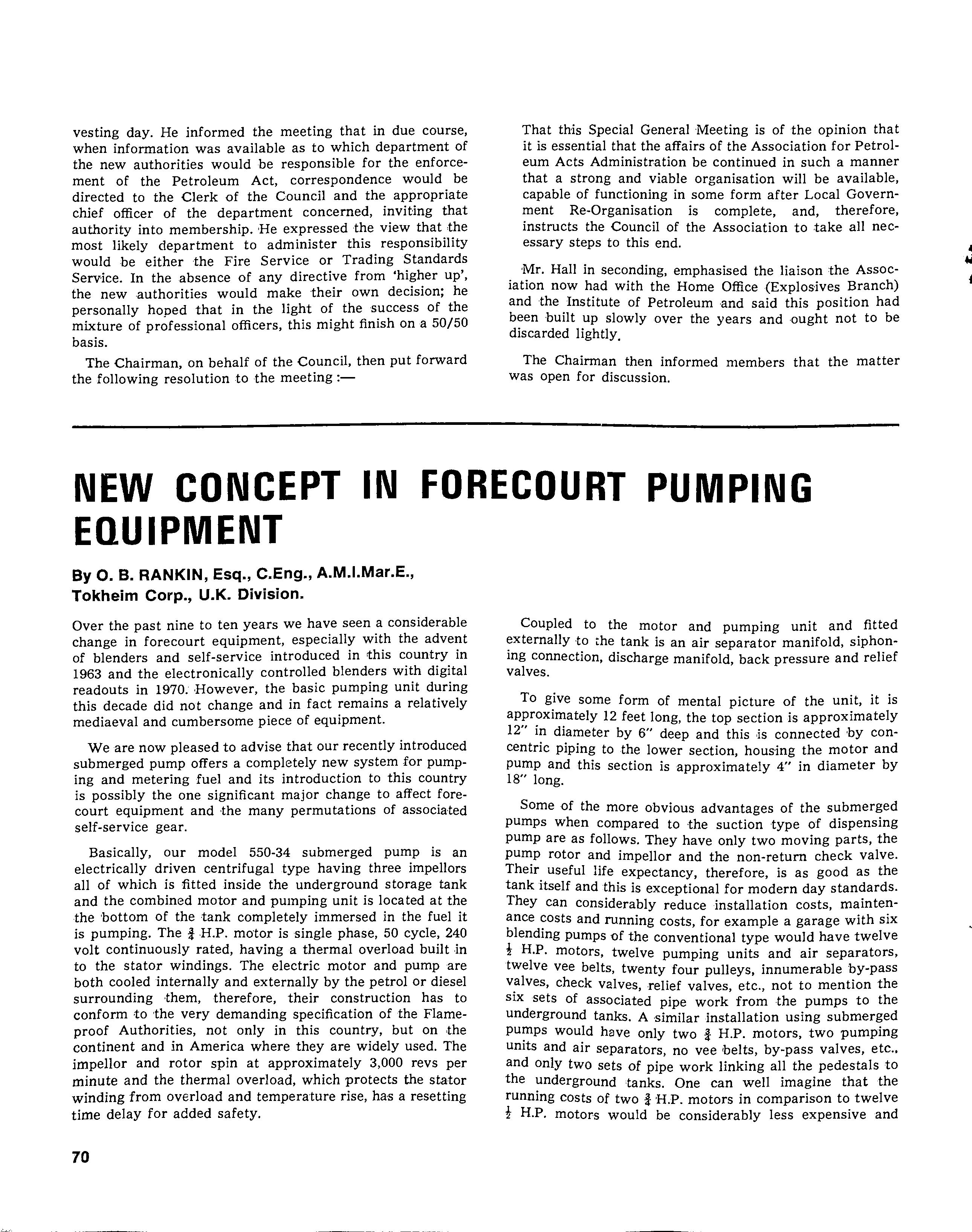
70
'-.i• j
that such an installation in most instances would also be considerably cheaper.
Sites where tank levels in relationship to island levels create a problem with normal pumping systems can be overcome by the use of submerged pumps, as delivery lines do not have to rise I" in every 10 ft. although it is preferable to have a fall back to the tank if possible, nor does the length of the delivery line materially affect the operation of the pedestal. Forcing liquid through a delivery line is preferable and not so restrictive as creating a vacuum to get petrol through to the dispensing point.
The removal of submerged pumps after installation for any reason is relatively simple and only requires the removal of three bolts which allows the complete pump and motor to be drawn out of the tank. Delivery pipes and electrical connections are not disturbed in any way and remain permanently connected to the tank lid mounting pipe. The units are completely water tight and can operate quite efficiently when ,the Street box becomes flooded, which is not uncommon.
Due to the stark simplicity of the unit, servicing costs should be considerably reduced and as has been proven in the past, these units do give almost trouble free service throughout their normal working life.
In operation, submerged pumps provide an extremely efficient means of pumping liquid from the storage tank to the point of dispensing, proven by the fact that two! H.P. motors can do the work of up to twelve! H.P. motors, which are required in the more conventional type of suction pumps. This model 550-34 unit has the capacity to pump up to 50 gallons per minute, therefore, a two product blender system with a submerged pump in the low and high tanks has the capacity to handle at least six all operating at the same time as the total capacity 'Of the two submerged pumps is anything up to 100 gallons per minute. The maximum pumping pressure with all nozzles closed IS under 30 Ibs. per sq. m. and the mmlmum pressure that the unit will operate at with all nozzles open and d I' '. e IVermg approximately 50 gallons per mmute IS over e .Jbs. per sq. in.
The remote pedest If. are ,similar to Our a s or use With submerged pumping ing units' current petrol pumps but have the pumpt ' air separators and motors etc. removed The mo ors are replaced with !" fl ' , type FLP 5394-1 1 ameproof solenoid valves of safety shear a so. fitted to each inlet is a model 541 a pedestal be kno;khdlCh protects the delivery lines should . e over. Cost savings h Id 1 b conSiderable should it b s ou a so e blender pedestals at ecolme necessary to replace the . . some ater date, as the cost of the pedestal IS conSiderably lower tha th . of pump. n e conventIOnal type
The of submerged pumps creates a flexibility in forecourt deSign that has hitherto been un-att' bl h '. ama e and also t e ease with. whIch the equipment and associated pipe work can be Installed may well reduce ,the l' '. ' norma SIte development time. Durmg the contsruction stage the submerged pump can be fitted to the underground tank at any
convenient time and the associated pipe work can be added at the time of fitting the unit or at a later date. Normally the underground tank will have two manholes, {lne for the pump having a 4" B.S.P. Boss and ,the other manhole for the dip and fill pipe (vent pipe and tank gauge if necessary). However, if offset fills are used then only one manhole ,is required as the 4" offset fill boss plus the 4" submerged pump boss together with vent pipe boss and tank gauge connections can easily be accommodated on the one manhole cover. I!" or 2" heavy gauge galvanised piping is taken to each pedestal preferably on one ring line which terminates at the furthest dispenser. The delivery line is "tee-d" off under each dispenser and there is no extra check valve or non-return valve required. The I!" riser is screwed directly into the safety shear valve supplied with each dispenser and there is a union coupling in the pump to ensure that the shear valve c-an easily be connected to the delivery line.
A highly sensitive leak detector valve can be supplied with each submerged pump and this is normally coupled to the pump in the factory and checked for sensitivity before shipment. The leak detector valve simply ensures -that there is always a minimum pressure of approximately 5 lbs. per sq. in. in the discharge line, should even a minute leak develop the pressure in the discharge line overnight or at times when the dispensers are not being used regularly will drop below 5 Ibs. per sq. in. and the detectQr valve will close. If this happens a delay in delivery will be noticed by the next customer and liquid will only flow w:hen the line has been re-charged causing the balanced piston to re-open the valve, which normally takes a minutes depending on the magnitude of the leak. Alter?atlvely, equally sensitive, a pressure switch on the dIscharge Ime coupled in series with the submerged contactor ho.ldon coil will effectively and inexpensively gIve early warnmg 'Of leaks. Both these safeguards are considerably more efficient in giving advance warning of leakage than the current system of suction pumping which does not always indicate a pipe fracture until considerable losses have occurred.
ShDuld a submerged pump be required to draw liquid from another tank i.e. in cases where two or mlorteh th me grade of petro ,- ere IS are cross connected on, e sa " d' t a siphDning connection which is coupled by a i h lameker . t F" or 2" balancing pipe between t e tan s. cDpper pIpe 0 % b d pump will then The built in air separator in the su merge . d th' develo u to 25" of vacuum in pIpe an -. IS . P P l'quid level m the mter-connectmg wIll ensure a common 1 b d tanks It ShDUld, therefore, be noted that one su . h dl more than one tank and, therefore, It IS pump can an e dump in every under. unnecessary to have a submerge P ground tank.
One final point on installation, it is advisable to fit a small '1 I' ht in the kiosk in parallel tD the submerged Plot runntmg Ignd preferably across the contactor and this pump mo ors a will give some indication that the underground are running. This point is rather as fare silent in -operation as are the island an ere ore the site operator will require some mdlcatlOn that every· thing is shut off prior to closing up shop.
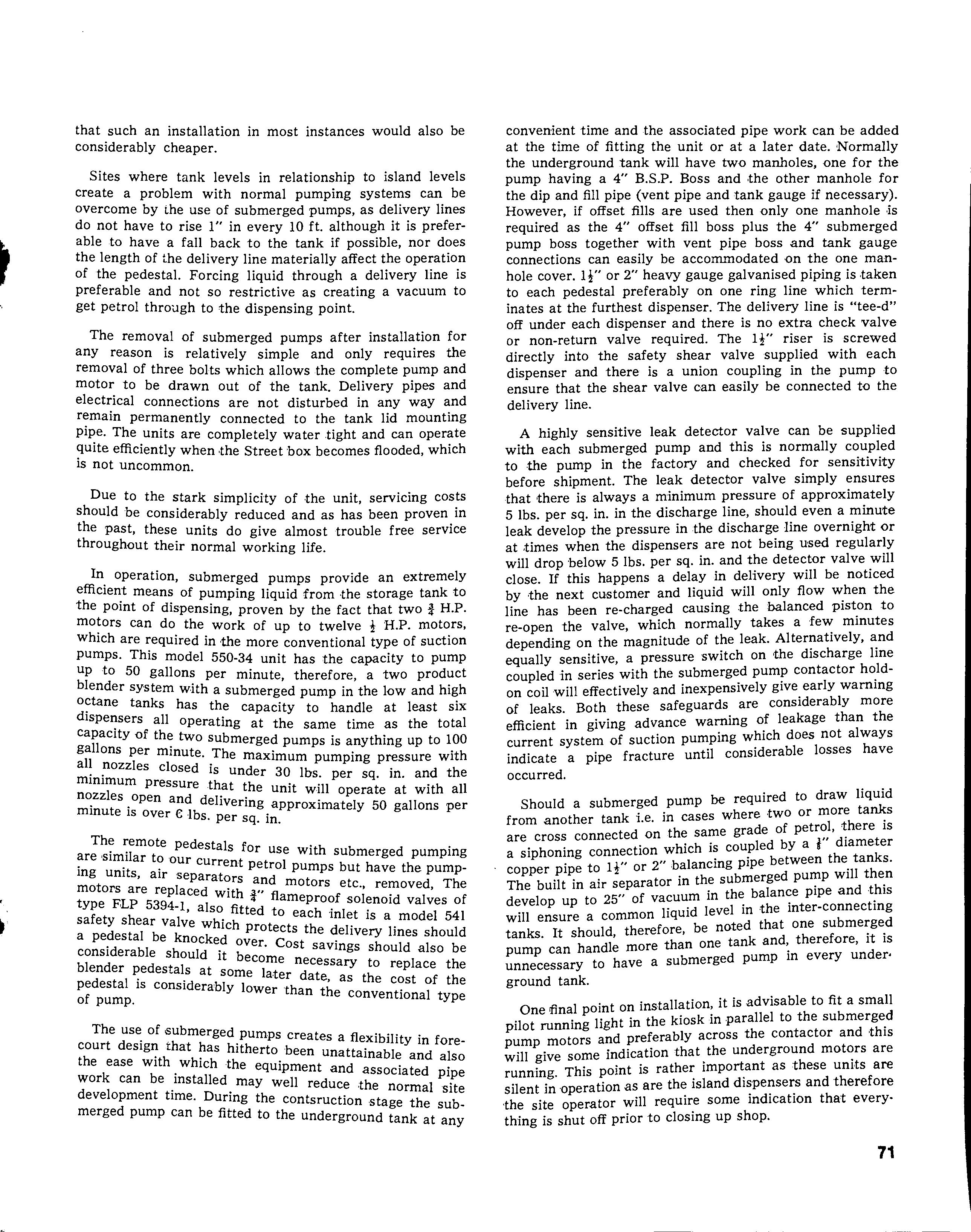
71
COUNCIL AT CHESTER
Report of a meeting held on Thursday, 1st June, 1972
Present
The following members attended: R. P. Holdaway. Esq. (Chairman). Messrs. J. Birks. J. W. Frid. G. H. Harvey. D. Hall, J. W. Hewison, T. Kerr, H. R. MelIor, C. T. Peacock, C. R. Peskett, R. E. J. Roden, J. Short. B. W. C. Thacker.
It was proposed by G. H. Harvey. seconded by H. R. Mellor and carried by the meeting that Standing Orders be confirmed.
Apologies
Apologies were received from Messrs. E. V. Beeby. J. Beer, P. Cartwright, W. Hetherington, K. C. Hughes, J. A. Sharp (Electrical Adviser).
Council Vacancies
At the request of the Chairman, item 5 was brought forward for consideration by the Council. The Chairman informed the meeting that there were two vacancies for members of the Council and it had been proposed by J. Short, seconded by R. E. J. Roden that J. MacLeod, Chief of Weights and Measures for the County CounCil of Dumbartonshire be elected to fill one of these vacancies. This was unanimously agreed by the meeting and Mr. MacLeod being present was duly elected and welcomed by the Chairman.
Minutes of Previous Meeting
The Minutes )f the previous meeting (circulated) were accepted by the meeting.
Matters Arising
J. Short, Immediate past Chairman, reported on his attendance at a meeting which had been arranged at the instigation of the Council by the Cumbria Branch. The Honorary Secretary was instructed to write to the Honorary Secretary of the Cumbria Branch in order to obtain a copy of the report of the Branch meeting and also a copy of the Branch Rules. He was further instructed to ascertain whether assistance of any kind could be given to the Branch by the Association Council.
In answer to a question concerning the Minutes of the Tripartite meeting held at the Institute of Petroleum on 2nd January, 1971 the Honorary Secretary reported that due to some oversight by the Secretary of this meeting, copies of the Minutes had not been received by himself nor other members who had attended. The Council was "informed that at a more recent meeting held in London on 23rd May, 1972 a promise was given that these Minutes together with the Minutes of the later meeting would be sent to the Association's representatives as soon as possible. The Honorary Secretary said that these will be ciruculated to members of the Council upon receipt.
Correspondence
The Honorary Secretary reported that the following correspondence had been received :-
(a) 'From the Home Office suggesting that discussions between the Institute of Petroleum. the Home Office and .this Association be initiated in the future to examine the question of hazard arising during the return of small quantities of petroleum spirit to underground tanks after pump testing.
(b) From Publicity and Public Relations Officer, County Borough of Hastings inviting the Association to hold its 1973 Conference in that town. The Chairman. ViceChairman and Honorary Secretary were requested to look into this.
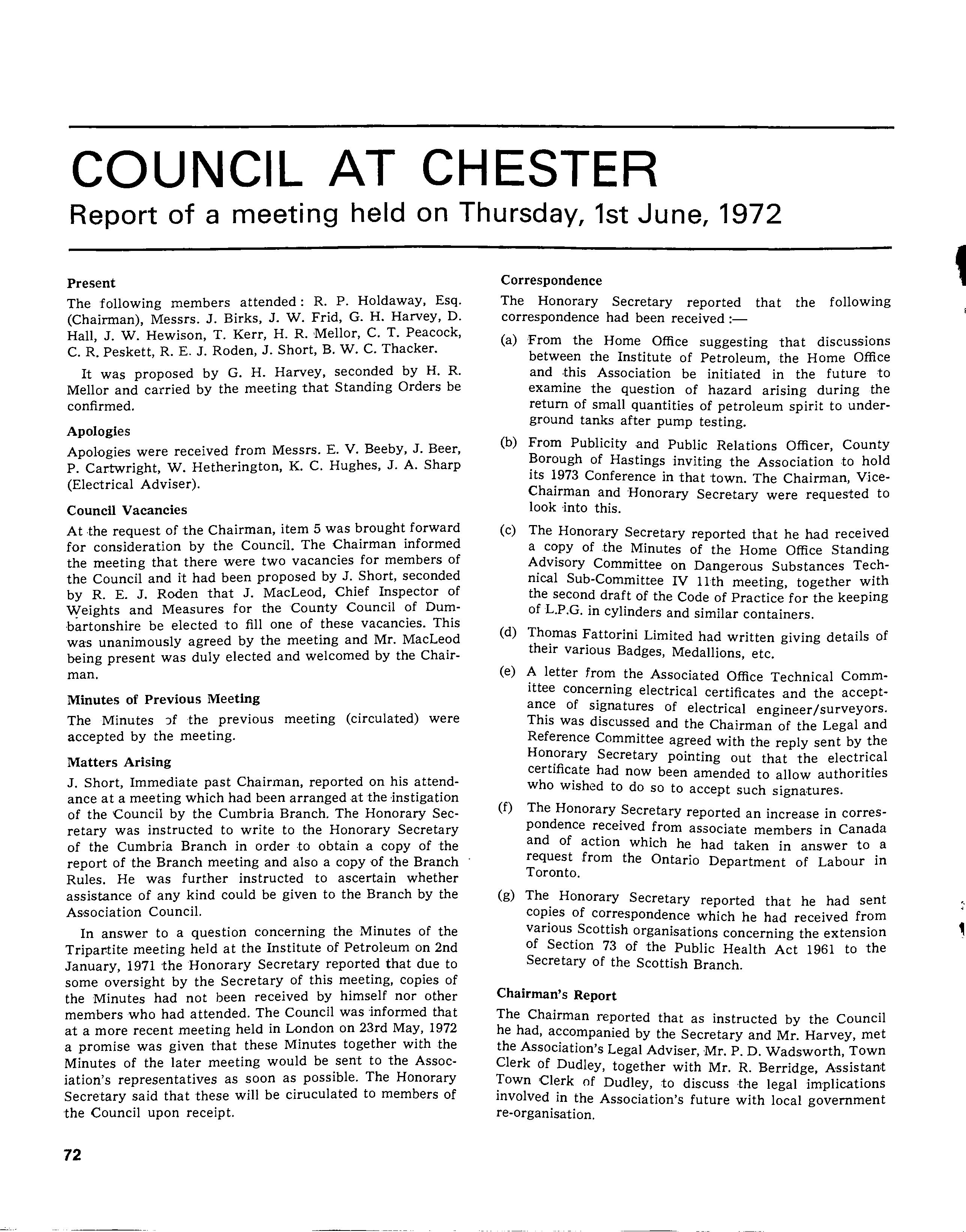
(c) The Honorary Secretary reported that he had received a copy of .the Minutes of the Home Office Standing Advisory Committee on Dangerous Substances Technical Sub-Committee IV 11th meeting. together with the second draft of the Code of Practice for the keeping ofL.P.G. in cylinders and similar containers.
(d) Thomas Fattorini Limited had written giving details of their various Badges, Medallions, etc.
(e) A letter from the Associated Office Technical Committee concerning electrical certificates and the acceptance of signatures of electrical engineer/surveyors. This was discussed and the Chairman of the Legal and Reference Committee agreed with the reply sent by the Honorary Secretary pointing out that the electrical certificate had now been amended to allow authorities who wished to do so to accept such signatures.
(f) The Honorary Secretary reported an increase in correspondence received from associate members in Canada and of action which he had taken in answer to a request from the Ontario Department of Labour in Toronto.
(g) The Honorary Secretary reported that he had sent copies of correspondence which he had received from various Scottish organisations concerning the extension of Section 73 of the Public Health Act 1961 to the Secretary of the Scottish Branch.
Chairman'S Report
The Cha'irman reported that as instructed by the Council he had, accompanied by the Secretary and Mr. Harvey. met the ASSOciation's Legal Adviser, Mr. P. D. Wadsworth, Town Clerk of Dudley, together with Mr. R. Berridge. Assistant Town Clerk of Dudley, to discuss the legal "implications involved in the Association's future with local government re-organisation.
72
After the Honorary Secretary outlined the situation as seen by the Association, Mr. Wadsworth was of the firm opinion that the Association should continue without interruption. He suggested that there should be no run-down of the Association's finances and went on to outline what he considered should be the Association's approach to the problems of re-organisation in 1974. The main point was that in the autumn of 1973, when the new authorities have been appointed, the Honorary Secretary of the Association, in liaison with himself, should circularise these new authorities.
He suggested that membership fees could well be graded in such a way that the new authorities paid a subscription in relation to iheir size. He further suggested that in relation to the size of the subscription of the particular authority, that authority be entitled to a number of voting members of the A!ssociation who could attend meetings, etc., and who would receive the Association's pUblications, i.e. the Bulletin, etc. Details of this could be worked out by a committee of the Association.
Mr. Wadsworth said the new County Councils appeared to be keen to administer additional duties, including petroleum, and they should therefore be duty-bound to honour undertakings made by the existing authorities who are at present members of the Association, and they would, as new authorities with Chief Officers inexperienced in petroleum administration, need all the expertise that the Association could offer.
Mr. Wadsworth, at the close of the meeting, emphasised his interest in the future of the Association and suggested that the Chairman and Honorary Secretary should arrange further meetings with him as and when they consider it to be necessary.
The Council, after a brief discussion, unanimously accepted this viewpoint and it was resolved: (a) that this matter be brought to the attention of the Special General Meeting to be held later this year with the recommendation to the members that it be accepted; (b) that enquiries be made at Barrow-upon-Soar Rural District Council, Rothley, Leicester, with a view to the special meeting being held at that venue and that, if this venue is suitable, the Clerk of Rural District Council, Mr. J. E. Bolton, who IS a member of the local government re-organisation committee of the Rural District Council's Association, be ,invited to ·address the meeting.
The Chairman's report was accepted with thanks by the Council.
Honorary Secretary's Report
The Honorary Secretary reported on applications for membership of the Association.
The Honorary Secretary requested authorisation to purchase two attachments for the Association's Addressograph machine to enable the existing machine to be used more speedily. In accepting the Honorary Secretary's report the Council agreed to the purchase of the items specified by the Honorary Secretary.
Honorary Treasurer's Report
The Honorary Treasurer reported details of the Association's financial position with which he expressed his satisfaction.
Honorary Editor's Report
The Honorary Editor reported on the recent increase in postal charges which now means that the cost of sending The Bulletin by post to the membership had risen to 3lp second class mail. As over 800 copies are sent each ·quarter, this amount's to a substantial increase in annual Bulletin expenses.
He informed Council members that the stock of Codes of Practice was now down to approximately 200 and there was a slow, but steady demand for copies of the Association's Electrical Certificate.
The H0110rary Editor reminded Council members and Branch Secretaries of the need for prompt transmissions of Branch Minutes and articles for publication in The Bulletin as these were a most useful source of copy and of great interest to the general membership.

In reply to a request for additional copies of The Bulletin to be sent to Branch Secretaries, the Honorary Editor stated that this could only be done if the number at print was increased. After discussion the Council approved an .jncrease in publication of 50 copies.
Committee Chairmen's Reports
(a) Constitution
and Rules
The ,Chairman of this Committee, D. Hall, reported that the outstanding copies of Branch Rules had now been received and although some Branch Secretaries had omitted to 'state the county areas included within their respective Branches, he was able to present these Branch Rules for signature by the Association's Chairman and Honorary Secretary.
After these Rules had been duly signed, the Honorary Secretary was instructed to send three copies of the Branch Rules to each Branch Secretary with the request that 'these be signed by the Chairman and Honorary Secretary of the respective Branch. Branch Secretaries were then to return two copies to the Honorary Secretary, one for retention by him, the other for retention by the Constitution and Rules Committee.
The Honorary Secretary was further instructed in the cases of Branches who failed to supply this information within one month, to specify the areas of those particular Branches and notify the Secretaries accordingly.
(b) Education and Publication
The Chairman of this Committee reported that his Committee had not met since the last Council meeting.
The Honorary Secretary reported under this heading that arrangements for the Advanced Seminar at Alcuin College, York University on 25th/28th September, were almost completed and that he would shortly be arranging for the printing of the course programmes.
73
He informed Council that there was a possibility of increasing the number of papers to be given from seven to eight. This paper to be on the subject of Immersible Pumps and Pressure Systems. As this subject is becoming topical, the Honorary Secretary was requested to make room for this extra paper. The Honorary Secretary reported that he had received firm booking for 47 places at the Seminar and as the course was limited to between 50 and 60, it would be advisable for people wishing to attend to apply without delay.
There was considerable discussion about the Association''S educational programme and it was decided, in view of pending local government re-organisation, not to hold an Advanced Seminar in 1973. It was agreed that the Council support any action by the Northern Districts to hold a school in 1973. Mr. H. R. Mellor, Chairman of the Education Committee was empowered by the Council to look into the possibility of such a course.
(c) Legal and Reference Committee
Prior to the Chairman of this Committee reporting, Mr. G. H. Harvey raised the question of the Home Office Circular 186, enquiring what advice the Committee should give on its contents. The Committee Chairman, Mr. C. R. Peskett, replied that his Committee had examined the question and in the light of subsequent enquiries, including a letter received by the Honorary Secretary from the Home Office, it was left for him to suggest that Petroleum Authorities were required only to approve suitable places for the parking of tanker vehicles and not to provide them. He was of the opinion that there was no general need for this type of parking but that he and his Committee would be pleased to hear of any particular problems which may arise, or have risen, in this connection and they would then give the matter further attention.
The Chairman of this Committee then went on to report on hi.; attendance at a further Tripartite Meeting which was held at The Institute of Petroleum on 23rd May, 1972 together with the Vice-Chairman of the Association and the Honorary Secretary. He referred to the item previously raised in these Minutes under 'Matters Arising' and informed the Council that he had not, as yet, received a copy of the Minutes of this latest meeting but that in order for the Council to have some insight into the contents of this meting, he had prepared the following notes :-
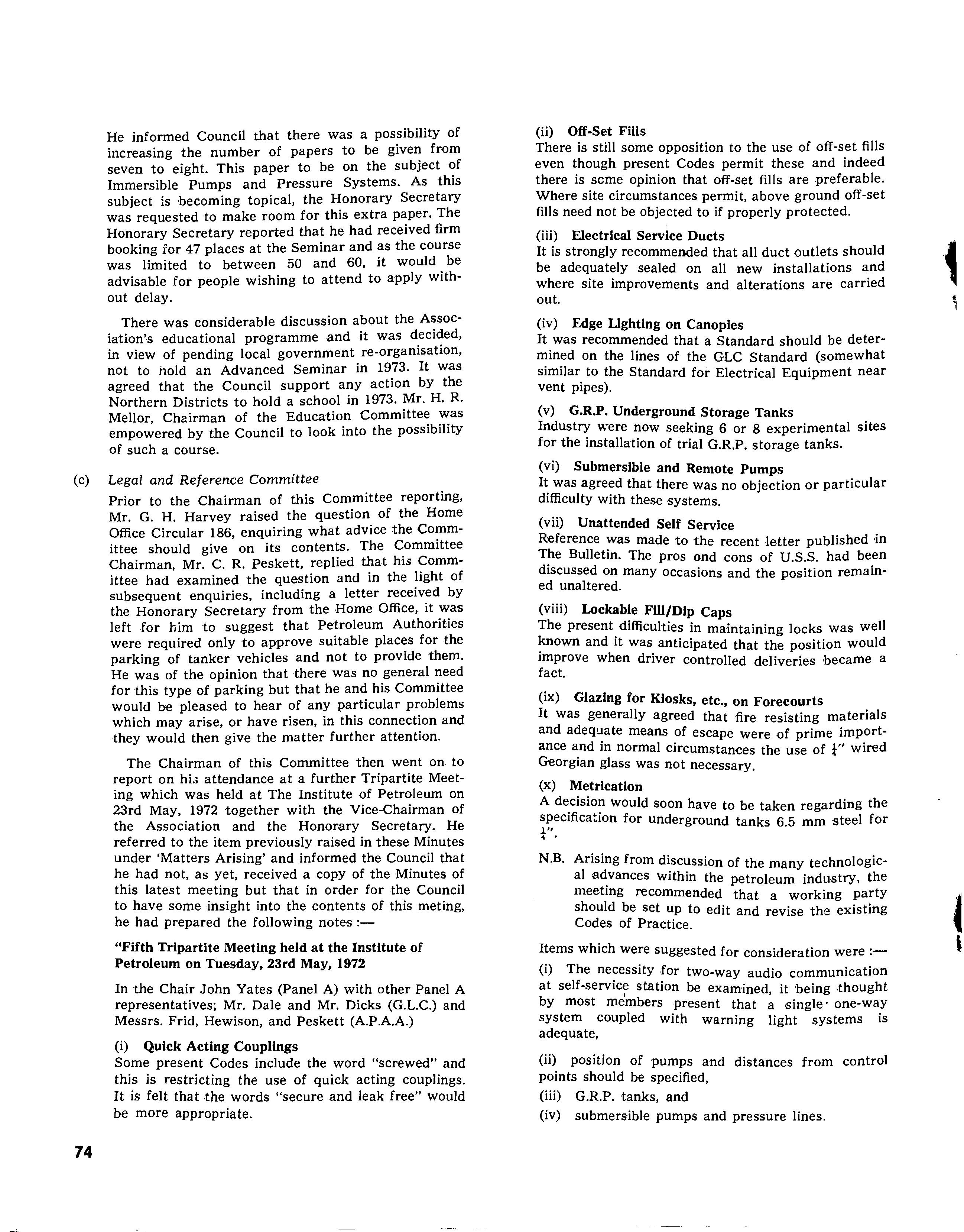
"Fifth Tripartite Meeting held at the Institute of Petroleum on Tuesday, 23rd May, 1972
In the Chair John Yates (Panel A) with other Panel A representatives; Mr. Dale and Mr. Dicks (G.L.C.) and Messrs. Frid, Hewison, and Peskett (AP.AA)
(i) Quick Acting Couplings
Some present Codes include the word "screwed" and this is restricting the use of quick acting couplings. It is felt that the words "secure and leak free" would be more appropriate.
(ii) Off-Set Fills
There is still some opposition to the use of off-set fills even though present Codes permit these and indeed there is scme opinion that off-set fills are preferable. Where site circumstances permit, above ground off-set fills need not be objected to if properly protected.
(iii) Electrical Service Ducts
It is strongly recommended that all duct outlets should be adequately sealed on all new installations and where site improvements and alterations are carried out.
(iv)
Edge Lighting on Canopies
It was recommended that a Standard should be determined on the lines of the GLC Standard (somewhat similar to the Standard for Electrical Equipment near vent pipes).
(v) G.R.P. Underground Storage Tanks
Industry were now seeking 60r 8 experimental sites for the installation of trial G.R.P. storage tanks.
(vi) Submersible and Remote Pumps
It was agreed that there was no objection or particular difficulty with these 'Systems.
(vii) Unattended Self Service Reference was made to the recent letter published ,in The Bulletin. The pros ond cons of U.S.S. had been discussed on many occasions and the position remained unaltered.
(viii)
Lockable Fill/Dip Caps
The present difficulties in maintaining locks was well known and it was anticipated that the position would improve when driver controlled deliveries became a fact.
(ix) Glazing for Kiosks, etc., on Forecourts
It was generally agreed that ,fire resisting materials and adequate means of escape were of prime importance and in normal circumstances the use of 1-" wired Georgian glass was not necessary.
(x) Metrication
A decision would soon have to be taken regarding the specification for underground tanks 6.5 mm steel for 1" . .
N.B. Arising from discussion of the many technological advances within the petroleum industry, the meeting recommended that a working party should be set up to edit and revise the existing Codes of Practice.
Items which were suggested for consideration were :(i) The necessity for two-way audio communication at self-service station be examined it being thought by most members present that single' one-way system coupled with warning light systems is adequate, (ii) position of pumps and distances from control points should be specified, (iii) G.R.P. tanks, and (iv) submersible pumps and pressure lines.
74
1
After some discussion during which the subject of 3-way valves was raised, R. E. J. Roden informed the Council that a number of these had been installed in the Birmingham area on the understanding that they would be removed after two years if they proved to be unsatisfactory. So far the majority were reasonably so but a number had given problems due to tightening of the valve even after a period as' short as four months. This report was accepted by the Council.
Appointment of Committee
Constitution and Rules
.., D. Hall, Newcastle-under-Lyme E. V. Beeby, Rugby J. Beer, Worcester
K. C. Hughes, Stafford J. Bennett, Morley
Legal and Reference
* C. R. Pesirett, Godalming
P. Cartwright, Hartlepool
G. H. Harvey, Dudley T. Kerr, Glanford Brigg
R. E. J. Roden, Birmingham J. McLeod, Dumbarton
Finance and General Purposes
Chairman + ,three Committee Chairmen Vice-Chairm.'ln
Immediate Past Chairman Honorary Secretary Honorary Treasurer Honorary Editor
Education and Publications
H. R. MelIor, Blackpool J. Birks, Chesterfield
S. W. Harris, Gloucester
W. Hetherington, Witney B. Hodgson, Wigton Vacancy * Chairman
AD HOC Committees
Representatives at Tripartite Meetings (Institute of Petroleum) Chairman Honorary Secretary Honorary Editor Chairman, Legal and Reference Committee R. E. J. Roden
Emergency Chairman Vice-Chairman
Immediate Past Chairman Honorary Secretary Honorary Treasurer
Any Other Business
The Honorary Secretary raised the question of custombuilt display cabinets for the keeping of petroleum mixtures safely in retail shops. Such a cabinet was at present being designed and constructed within his authority and he was asked to 'Supply details to the Honorary Editor for publication in The Bulletin. The Chairman requested that the thanks of the Association to the Chief Fire Officer of the Chester City Fire Brigade be recorded in the Minutes and that the Honorary Secretary should write expressing the Association's appreciation for the hospitality.
There being no other business, the meeting closed at 5.0 p.m.
BRANCH REPORTS

Anglia
The Annual General Meeting of the Branch was held at the R.A.F./U.S.A.F. Air Base, Mildenhall, Suffolk, on 12th April, 1972.
Present
The meeting was opened by the Chairman, Mr. J. Wookey, who welcomed the 32 members who were present. Seven apologies were received.
Minutes
The minutes of .the previous Annual General Meeting, previously circulated, were agreed by the meeting and signed by the Chairman.
Matters Arising
There were no matters arising from the minutes.
Chairman's Report
In giving his report the Chairman, Mr. J. Wookey, reviewed the activities of the Branch during his year of office. He made mention of the progress which the Branch had made during the year and of the steady growth in membership. He referred in detail to the problems which confronted the local author.ities during re-organisation and expressed his concern at the loss of continuity which could be experienced in the petroleum field generally during this period. He drew members' attention .to the special general meeting of the Association wnich was to be held in the autumn which had this problem <IS the main subject for discussion together with the overalI future of the Association.
The Chairman thanked the officers of the Branch and the members for their valued support during his year of office.
75
Honorary Secretary-Treasurer's Report
The Honorary Secretary-Treasurer, J. W. Frid, informed members that the membership of the Branch now stood at 55 plus 9 associate members which represented a slight increase over the previous year and which followed the general level of increase throughout the Association. He informed the meeting that during the year a considerable number of requests for information and assistance with problems had been received, all of which had been dealt with either by himself or through the Chairman of the Association's Legal and Reference Committee.
The Honorary Secretary-Treasurer ,then drew members' attention to the statement of the Branch's accounts which had been circularised which indicated a slight increase in balance over the previous year. After some discussion by the members, the Honorary Secretary-Treasurer's report was accepted by the meeting.
Branch Reprentative's Report
The Branch Representative, J. W. Frid, reported that during the year he had attended three Council meetings of the Association, together with two meetings of the Finance and General Purposes Committee and one meeting of the Education Committee. He further reported that during the year the Association's membership had grown to over 800 and that its various Committees had been very active. He drew members' attention to the arrangements which were being made to hold a second Advanced Seminar at York University from 25th-28th September, 1972.
As Honorary Secretary of the Association, Mr. Frid went on to report that he was to attend a meeting with the Association's Legal Adviser at Dudley later in the month to discuss the future of the Association in the light of local government re-organisation. The Council of the Association, he said, would be making every attempt to ensure that the Association continued in being as a viable source of information and support to all officers engaged in the field of petroleum administration. A report of this meeting would appear in "The Bulletin" at a later date.
In concluding he thanked members for their assistance and co-operation during the past year. There followed considerable discussion on all aspects of the Association's activities from which the Chairman and Honorary SecretaryRepresentative answered various questions. It was proposed by Mr. Martin, seconded by Mr. WiIson, that the two officers Mr. Wookey and Mr. Frid be thanked for the duties which they had undertaken on behalf of the Branch during the year. This was agreed by the meeting.
Election of Officers for the Ensuing Year
The Chairman, after having asked for nominations, put forward the name of Mr. C. W. Parcell (Hunts. & Godmanchester) (Vice-Chairman) for the office of Chairman of the Anglia Branch for the year 1972-73. This was seconded 'by Mr. Phipps (St. Ives) and on the showing of hands Mr. Parcell was duly elected. In his absence, Mr. Wookey continued in the chair.
It was proposed by Mr. Hoyle (South Cambs.), seconded by Mr. Hill, that Mr. Scrivener (Saffron Walden) be elected Vice-Chairman of the Branch for the year 1972-73. This was agreed. It was proposed by Mr. Lee (Chelmsford),

seconded by Mr. Smith (City of Ely), that Mr. Frid continue in office as H<-norary Secretary-Treasurer and Branch Representative and after 'Mr. Wookey had thanked him on behalf of the Branch for his past services, Mr. Frid was duly elected.
It was proposed by the Chairman, seconded by the Honorary Secretary, that Mr. Lee (Chelmsford) be elected to the Branch Committee. This was agreed. It was proposed by Mr. Phipps (St. Ives), seconded by Mr. Gethin (Hariow), that Mr. Clark (Southend) be also elected to the Branch Committee. This was agreed by the meeting. The names of Mr. Hoyle (South Cambs.) and Mr. Hill (City of Cambridge) were proposed and seconded as Auditors for the year 1972-73. This was agreed by the meeting.
Any Other Business
Under :this item the question of the autumn meeting venue was raised and after various suggestions had been considered it was left to the Branch Chairman, Honorary Secretary Thompson (Basildon) to make arrangements for this meetIng.
The meeting then adjourned for lunch at the Officers' Club and following this, the Branch's thanks were expressed to .t?: Commanding Officer, U.S.A.F. MildenhaIl for the facilities and hospitality given to the Branch members.
After a guided tour of the base fuel installations, laboratories and other places of interest was embarked upon. After spending an extremely interesting afternoon tea was taken at the Officers' Club and . t th I ' of the meetin the prIor ? e c osure g, Honorary Secretary was Instructed to write a letter the thanks of all members to the Officer CommandIng.
The meeting closed at 4.30 p.m.
Yorkshire
An informal meeting of Petroleum Offi' Branch Area was held t h cers In the Yorkshire Fire Service Headqua tat e Riding County Council
The meeting was or ers. at Blrkenshaw on 19th July, 1972. suggestion at the by the Branch following a that such a meetm'g t eneral Meeting of the Branch o ISCUSS the eff t f ment Re-organisation ec s 0 Local Governon petroleum d . . t' k would be of benefit to th Offi a mlms ratIOn wor e cers engaged on these duties.
The meetIng was attended b members and we w f y 20 members and 9 non, ere ortunate t h . h th National Chairman of the A '. 0 ave Wit us e . SSOclatIon, Mr. R. P. Holdaway.
The mornIng session was chaired . Yorkshire Branch Ch :by Mr. P. Murray, the airman, Who for th b fit f th members present outIin d h e ene 0 e noniation to obtain 'f e .t e efforts made by the AssocPetroleum Officers of administrat!onamongst ship of the Assodia' e urged :them to conSIder memb.erhon. Followmg Mr Murray's opemng Mr. Holdaway addressed meeting and gave IS views on effects of re-organisation on petroleum Officers. He said that since the Bill, shortly to become an
76
f
Act, placed the enforcement of petroleum acts at the first,tier level, the outcome would be that enforcement would go either to the Fire Service or the Trading Standards service. Mr. Holdaway expressed the hope that it would not become a one-discipline enforcement, since he felt that the present diversity of officers at present employed on petroleum administration meant that a vast amount of experience was available to the Association.
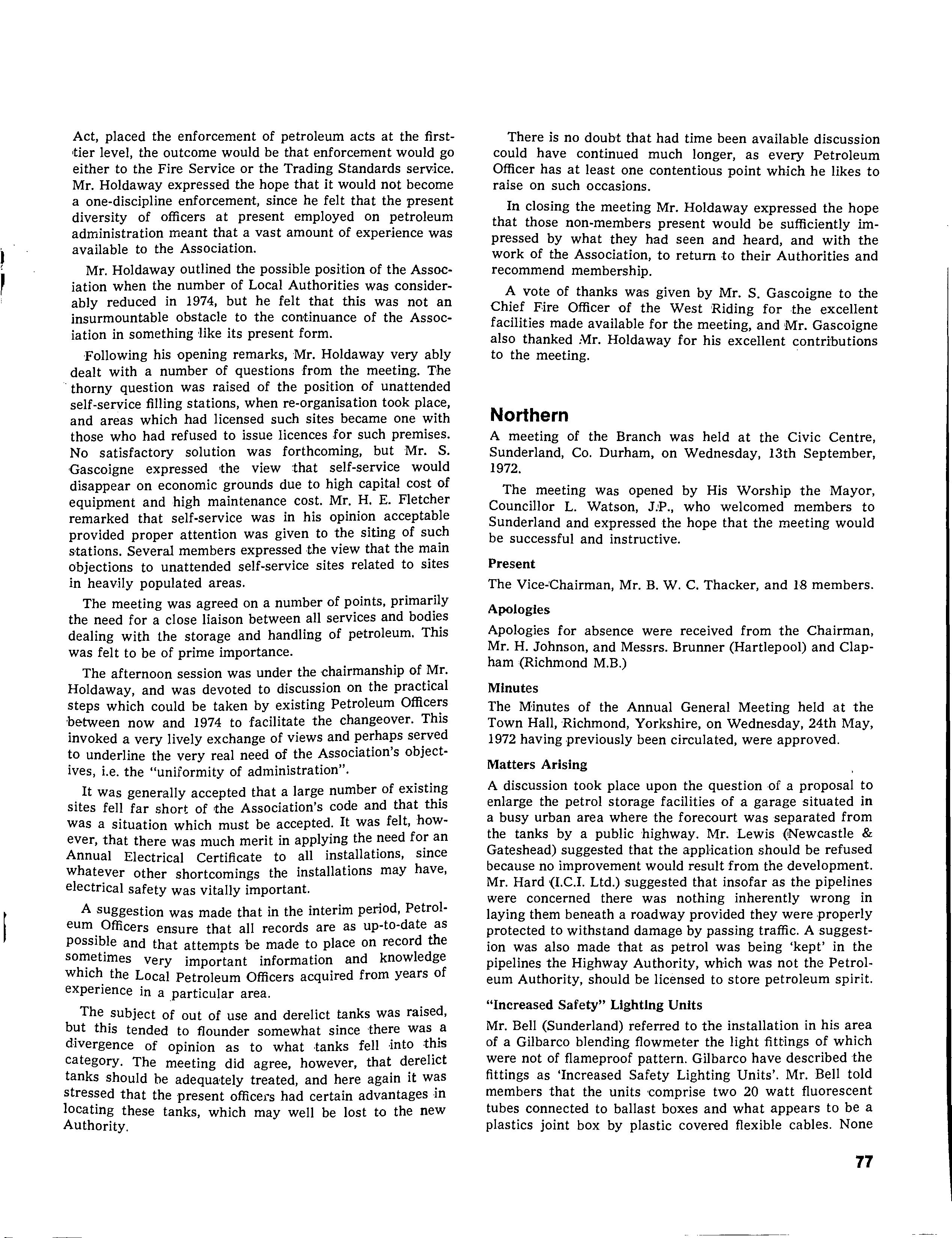
Mr. Holdaway outlined the possible position of the Association when the number of Local Authorities was considerably reduced in 1974, but he felt that this was not an insurmountable obstacle to the continuance of the Association in something like its present form.
-Following his opening remarks, Mr. Holdaway very ably dealt with a number of questions from the meeting. The thorny question was raised of the position of unattended self-service filling stations, when re-organisation took place, and areas which had licensed such sites became one with those who had refused to issue licences for such premises. No satisfactory solution was forthcoming, but Mr. S. Gascoigne expressed the view that self-service would disappear on economic grounds due to high capital cost of equipment and high maintenance cost. Mr. H. E. Fletcher remarked that self-service was in his opinion acceptable provided proper attention was given to the siting of such stations. Several members expressed the view that the main objections to unattended self-service sites related to sites in heavily populated areas.
The meeting was agreed on a number of points, primarily the need for a close liaison between all services and bodies dealing with the storage and handling of petroleum. This was felt to be of prime importance.
The afternoon session was under the -chairmanship of Mr. Holdaway, and was devoted to discussion on the practical steps which could be taken by existing Petroleum between now and 1974 to facilitate the changeover. ThIS invoked a very lively exchange of views and perhaps served to underline the very real need of the Association's objectives, i.e. the "uniformity of administration".
It was generally accepted that a large number of sites fell far short of ,the Association's code and that thIS was a situation which must be accepted. It was felt, however, that there was much merit in applying the need for an Annual Electrical Certificate to all installations, since whatever other shortcomings the installations may have, electrical safety was vitally important.
A suggestion was made that in the interim period, Petroleum Officers ensure that all records are as up-to-date as possible and that attempts be made to place on record the sometimes very important information and knowledge which the Local Petroleum Officers acquired from years of experience in a particular area.
The subject of out of use and derelict tanks was raised, but this tended to flounder somewhat since there was a divergence of opinion as to what tanks fell into this category. The meeting did agree, however, that derelict tanks should be adequMely treated, and here again it was stressed that the present officel's had certain advantages .jn locating these tanks, which may well be lost to the new Authority.
There is no doubt that had time been available discussion could have continued much longer, as every Petroleum Officer has at least one contentious point which he likes to raise on such occasions.
In closing the meeting Mr. Holdaway expressed the hope that those non-members present would be sufficiently impressed by what they had seen and heard, and with the work of the Association, to return to their Authorities and recommend membership.
A vote of thanks was given by Mr. S. Gascoigne to the Chief Fire Officer of the West 'Riding for the excellent facilities made available for the meeting, and Mr. Gascoigne also thanked Mr. Holdaway for his excellent contributions to the meeting.
Northern
A meeting of the Branch was held at the Civic Centre, Sunderland, Co. Durham, on Wednesday, 13th September, 1972.
The meeting was opened by His Worship the Mayor, Councillor L. Watson, J.P., who welcomed members to Sunderland and expressed the hope that the meeting would be successful and instructive.
Present
The Vice-Chairman, Mr. B. W. C. Thacker, and 18 members.
Apologies
Apologies for absence were received from the Chairman, Mr. H. Johnson, and Messrs. Brunner (Hartlepool) and Clapham (Richmond M.B.)
Minutes
The Minutes of the Annual General Meeting held at the Town Hall, Richmond, Yorkshire, on Wednesday, 24th May, 1972 having previously been circulated, were approved.
Matters Arising
A discussion took place upon the question or a proposal to enlarge the petrol storage facilities of a garage situated in a busy urban area where the forecourt was separated from the tanks by a public highway. Mr. Lewis (Newcastle & Gateshead) suggested that the appHcation should be refused because no improvement would result from the development. Mr. Hard (I.C.I. Ltd.) suggested that insofar as the pipelines were concerned there was nothing inherently wrong in laying them beneath a roadway provided they were properly protected to withstand damage by passing traffic. A suggestion was also made that as petrol was being 'kept' in the pipelines the Highway Authority, which was not the Petroleum Authority, should be licensed to store petroleum spirit.
"Increased Safety" Lighting Units
Mr. Bell (Sunderland) referred to the installation in his area of a Gilbarco blending flowmeter the light fittings of which were not of flameproof pattern. Gilbarco have described the fittings as 'Increased Safety Lighting Units'. Mr. Bell told members that the units -comprise two 20 watt fluorescent tubes connected to ballast boxes and what appears to be a plastics joint box by plastic covered flexible cables. None
77
of the components appeared to be protected against the ingress of petroleum spirit vapours. All parts are mounted immediately above the integrating mechanism within the pump housing. Correspondence with GUbarco appeared to indicate that the unit has been approved by B.A.S.E.E.F.A. for use in measuring ·instruments which have also been approved by B.A.S.E.E.F.A., but it is understood that the necessary approval for the model of instrument in question has not yet been given. Mr. Bell was of the opinion, however, that this information was insufficient to satisfy his Council's Principles of Construction as he had not been able to obtain an assurance that this lighting equipment was suitable for use in Division 1 locations. He asked whether other members had information upon the matter. The Hon. Secretary said that he had come upon a similar instrument which had recently been installed in Hartlepool and that his correspondence with Gilbarco appeared to confirm the position ·as related by Mr. Bell. No member was able to provide further inf.ormation upon the subject and it was therefore agreed that the Hon. Secretary be instructed to pursue the matter further.
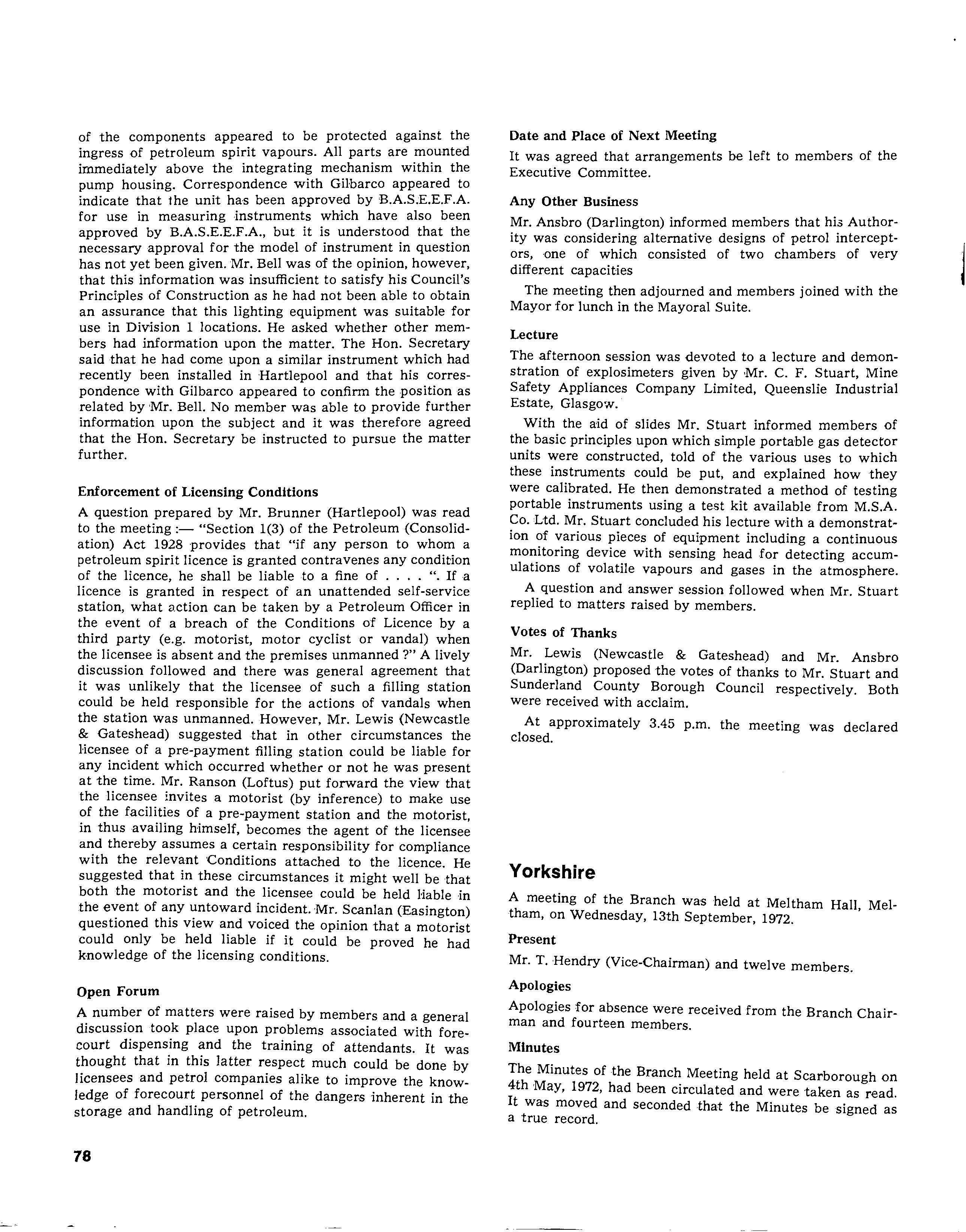
Enforcement of Licensing Conditions
A question prepared by Mr. Brunner (Hartlepool) was read to the meeting:- "Section 1(3) of the Petroleum (Consolidation) Act 1928 provides that "if any person to whom a petroleum spirit licence is granted contravenes any condition of the licence, he shall be liable to a fine of .... ". If a licence is granted in respect of an unattended self-service station, what a.ction can be taken by a Petroleum Officer in the event of a breach of the Conditions of Licence by a third party (e.g. motorist, motor cyclist or vandal) when the licensee is absent and the premises unmanned ?" A lively discussion followed and there was general agreement that it was unlikely that the licensee of such a filling station could be held responsible for the actions of vandals when the station was unmanned. However, Mr. Lewis (Newcastle & Gateshead) suggested that in other circumstances the Hcensee of a pre-payment filling station could be liable for any incident which occurred whether or not he was present at the time. Mr. Ranson (Loftus) put forward the view that the licensee invites a motorist (by inference) to make use of the facilities of a pre-payment station and the motorist, in thus .avaiIing himself, becomes the agent of the licensee and thereby assumes a certain responsibility for compliance with the relevant 'Conditions attached to the licence. He suggested that in these circumstances it might well be that both the motorist and the licensee could be held l'iable in the event of any untoward incident. Mr. Scanlan (Easington) questioned this view and voiced the opinion that a motorist could only be held liable if it could be proved he had knowledge of the licensing conditions.
Open Forum
A number of matters were raised by members and a general discussion took place upon problems associated with forecourt dispensing and the training of attendants. It was thought that in this latter respect much could be done by licensees and petrol companies alike to improve the knowledge of forecourt personnel of the dangers inherent in the storage and handling of petroleum.
Date and Place of Next Meeting
It was agreed that arrangements be left to members of the Executive Committee.
Any Other Business
Mr. Ansbro (Darlington) informed members that hi" Authority was considering alternative designs of petrol interceptors, one of which consisted of two chambers of very different capacities
The meeting then adjourned and members joined with the Mayor for lunch in the Mayoral Suite.
Lecture
The afternoon session was devoted to a lecture and demonstration of explosimeters given by Mr. C. F. Stuart, Mine Safety Appliances Company Limited, Queenslie Industrial Estate, Glasgow.
With the aid of slides Mr. Stuart informed members of the basic principles upon which simple portable gas detector units were constructed, told of the various uses to which these instruments could be put, and explained how they were calibrated. He then demonstl'ated a method of testing portable instruments using a test kit available from M.S.A. Co. Ltd. Mr. Stuart concluded his lecture with a demonstration of various pieces of equipment including a continuous monitoring device with sensing head for detecting accumulations of volatile vapours and gases in the atmosphere.
A question and answer session followed when Mr. Stuart replied to matters raised by members.
Votes of Thanks
Mr. Lewis (Newcastle & Gateshead) and Mr. Ansbro (Darlington) proposed the votes of thanks to Mr. Stuart and Sunderland Gounty Borough Council respectively. Both were received with acclaim.
At approximately 3.45 p.m. the meeting was declared closed.
Yorkshire
A meeting of the Branch was held at Meltham Hall, Meltham, on Wednesday, 13th September, 1972.
Present
Mr. T. Hendry (Vice-Chairman) and twelve members.
Apologies
Apologies for absence were received from the Branch Chairman and fourteen members.
Minutes
The Minutes of the Branch Meeting held at Scarborough on 4th May, 1972, had been circulated and were taken as read. It was moved and seconded that the Minutes be signed as a true record.
78
Matters Arising
Mr. G. Garrett asked if any further information was available regarding the "Johns Pressure Meter" referred to by Mr. C. Peacock, in connection with tank testing in West Germany. Mr. Wallace and is.P. Ltd.) said that he had made enquiries of colleagues within his Company, but none of them had any knowledge of the equiipment. It was resolved that the Secretary should make further enquiries of the Home Office to ascertain if they had any knowledge of this particular equipment.
A general discussion took place on tank testing, and this revealed that members were not satisfied with the present system of periodic testing, and the feeling of the meeting was that there was need for research into the possibility of a permanent monitoring system on the soundness of underground tanks.
Correspondence
The Secretary reported that he had written to Mr. K. Holland of the West Riding County Council Fire Service on behalf of the Branch, congratulating him on his appointment as Chief Inspector of Fire Services.
Date, Place and Subject Matter of the Next Meeting
It was agreed that the date and place of the next meeting be left to the Secretary and Chairman to arrange. Two suggestions were received regarding subject matters,; a paper on "Unattended Self-Service Installations" and one on tanker construction, the latter to be in conjunction with
a physical inspection of a tanker, ·if one could be made available. Mr. Wallace kindly agreed to make enquiries as to :the provision of both these subjects and it was agreed that the final details be left to Mr. Wallace and the Branch Secretary.
Any Other Business
The remainder of the morning session was devoted to the discussion on members' problems. Mr. R. Sample (Scarborough) asked what "size" of light source would give compliance with his authority's licensing standards of 10 lumens at the top of the pump unit on unattended selfservice sites. It was felt that the question was largely academic, since the lighting installed on ·sites of this nature produced a much higher light intensity than the 10 lumens required. It was pointed out by Mr. Wallace, however, that the light intensity would deteriorate without proper maintenance. Mr. Garrett (Doncaster) asked about the ·incidence of accidents in relation to off-set fill pipes. The general view was that where such accidents did occur they were not due to ,the offset fill pipe as such, but due to failure to observe the requirements of the the conveyance regulations.
The morning session was closed and the meeting adjourned fora buffet lunch.
Afternoon Session
The ·afternoon session was given over to a conducted tour of David Brown's Tractor Works. This proved to be a very interesting and ·instructive visit.
Legal Proceedings
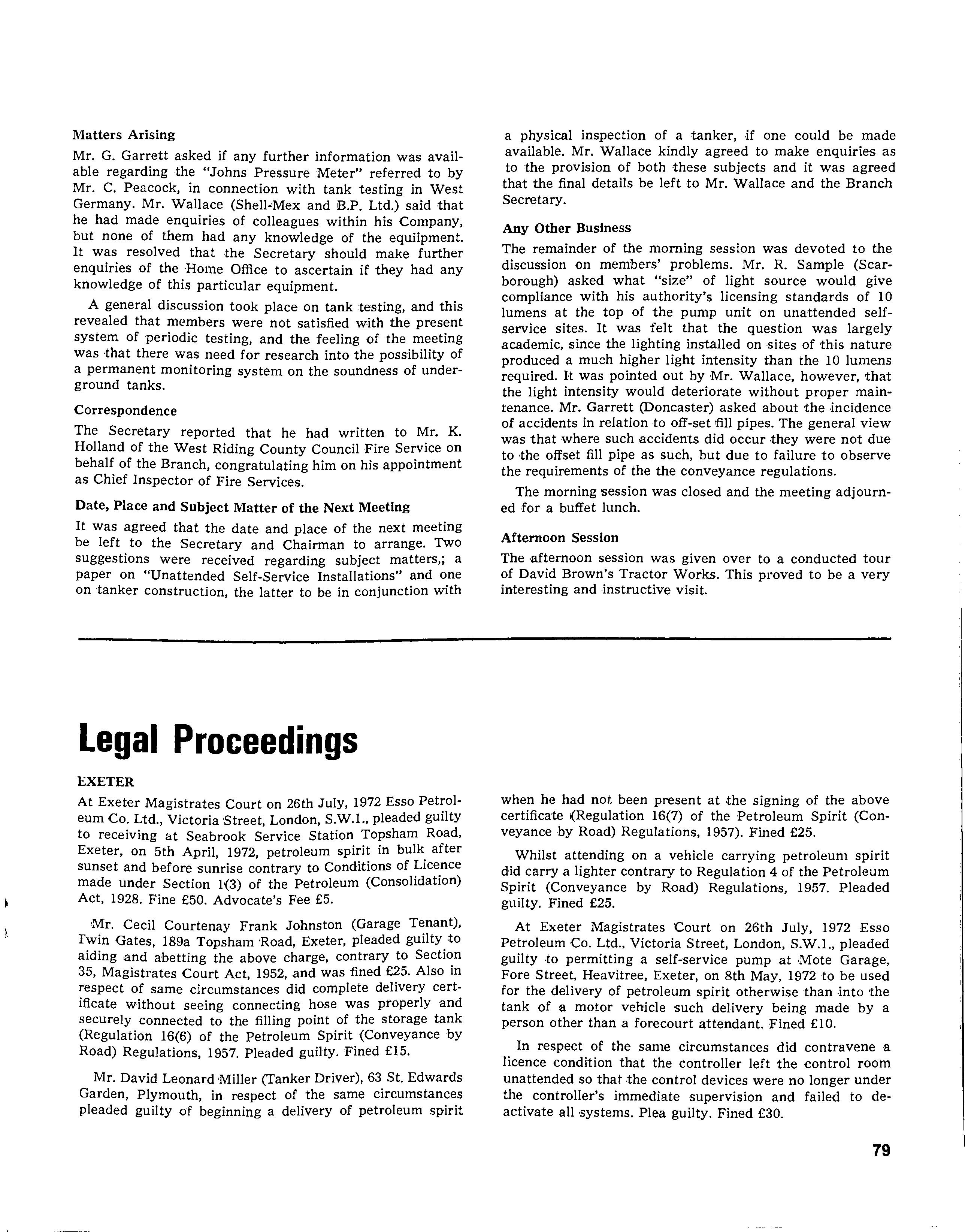
EXETER
At Exeter Magistrates Court on 26th July, 1972 Esso Petroleum Co. Ltd., Victoria Street, London, S.W.I., pleaded guilty to receiving at Seabrook Service Station Topsham Road, Exeter, on 5th April, 1972, petroleum spirit in bulk after sunset and before sunrise contrary to Conditions of Licence made under Section 1(3) of the Petroleum (Consolidation) Act, 1928. Fine £50. Advocate's Fee £5.
Mr. Cecil Courtenay Frank Johnston (Garage Tenant), Twin Gates, 189a Topsham Road, Exeter, pleaded guilty. to aiding and abetting the above charge, contrary to 35, Magistrates Court Act, 1952, and was fined £25. Also ID respect of same circumstances did complete delivery certificate without seeing connecting hose was properly and securely connected to the filling point of the storage tank (Regulation 16(6) of the Petroleum Spirit (Conveyance by Road) Regulations, 1957. Pleaded guilty. 'Fined £15.
Mr. David Leonard Miller (Tanker Driver), 63 St. Edwards Garden, Plymouth, in respect of the same circumstances pleaded guilty of beginning a delivery of petroleum spirit
when he had not been present at the signing of the above certificate (Regulation 16(7) of the Petroleum Spirit (Conveyance by Road) Regulations, 1957). Fined £25.
Whilst attending on a vehicle carrying petroleum spirit did carry a lighter contrary to Regulation 4 of the Petroleum Spirit (Conveyance by Road) Regulations, 1957. Pleaded guilty. Fined £25.
At Exeter Magistrates Court on 26th July, 1972 Esso Petroleum Co. Ltd., Victoria Street, London, S.W.I., pleaded guilty ·to permitting a self-service pump at Mote Garage, Fore Street, Heavitree, Exeter, on 8th May, 1972 to be used for the delivery of petroleum spirit otherwise than .into the tank of a motor vehicle such delivery being made by a person other than a forecourt attendant. Fined £10.
In respect of the same circumstances did contravene a licence condition that the controller left the control room unattended so that the control devices were no longer under the controller's immediate supervision and failed to deactivate all systems. Plea guilty. Fined £30.
79
BRADFORD
On Friday, 25th August, 1972 a case against John Wilkinson & Sons (Greengates) Ltd., Harrogate Road, Bradford was heard at Bradford Magistrates Court, defendant pleading not guilty to an offence against Article 10 of the Petroleum Spirit (Motor Vehicle, etc.) Regulations 1929.
A fire -occurred whilst an operation involving the removal of a leaking petroleum tank from a Ford Anglia Estate Car was taking place. On this type of car it is not possible to drain the tank from the bottom and the tank was to be removed still containing the petrol which was estimated as being 3 to 5 gallons.
The car was situated with the back end jacked up onto axle stands and over the top of the workshop pit, this enabled one person to work in the pit and one over the back end of -the car, the intention being to undo all connections to the tank including theholding bolts and petrol feed pipes and filler pipes enabling the tank to be manhandled from above and below and the tank lifted out in an upward direction.
In the pit and directly below the car was situated two fluorescent light fittings, one at each side of the pit. These light fittings were of the ordinary type and not flame proof or of the totally enclosed type, and were switched on.
On the day of the occurrence two apprentice mechanics had attempted to remove the tank in the manner already described, in attempting to lift the tank petrol was spilled from the tank and fell directly on to one of the light fittings, a few seconds later the tube broke and the petrol fumes became 'ignited burning two apprentices and involving the Ford Anglia Estate car.
Consideration of these factors led the Council to lay information of an alleged infringement of Article 10 of the Petroleum Spirit (Motor Vehicles, etc.) Regulations 1929. The defendant pleaded not guilty and defended the case on the grounds that the case did not properly fall under the Petroleum Spirit (Motor Vehicle, etc) Regulations in that the premises were a factory and fell under the jurisdiction of H.M. Factory Inspectorate who had not chosen to lay information as to any infringement under the Factory Act legislation. The repair shop was not of course, part of the licensed petroleum installation and therefore there was no infringement of the licensing conditions, and there was no case to answer.

The magistrates took the view that there was a case to answer, and after hearing the facts found the case proved and fined the defendant £50 with £30 costs.
GODALMING
The failure ?f a Godaln:ing ?etrol station to comply with authOrIty hcensmg regulations led to a firm bemg fined at Godalmmg Magistrates Court.
Summonses under the 'Petroleum (Consolidation) Act 1928 were brought against Gem Petroleum Ltd., of Watford Herts.. by Mr. James Faulkner, Deputy Town Clerk behalf.o.f Godalming Borough Council. The Act gives iocal authOritIes powers to grant petrol Hcences within its areas and impose whatever conditions it deems necessary
A representative of Gem Petroleum Ltd., Mr. M. LindsayBell, had said that the firm pleaded guilty to one charge of failing to keep storage tanks securely locked, and guilty to a charge of having no main cap on three dipping-pipes, no secondary cap on two other pipes, a defective manhole and a damaged flame trap.
He said the firm pleaded not guilty to failing to give notice of -any leakage or suspected leakage. When Mr. Lindsay-Bell tried to explain why the firm objected to this offence, the Magistrate's Clerk, Mr. R. H. Percy, told him he was not legally qualified and had no right to speak except to give evidence about what he knew of his own knowledge in the witness-box.
Mr. Percy advised the magistrates the case would have to be adjourned and asked Mr. Faulkner if he would agree to this. Mr. Faulkner indicated that he would.
After some further discussion Mr. Percy asked Mr. FauJkner -if he would accept the pleas and he indicated that he would. The hearing then proceeded.
Mr. Faulkner then told the court he would be calling an inspector to give evidence to -show the conditions that were at Apex Autopoint, The Wharf, Godalming, when he VISIted the site.
The evidence would show, he said, that "the offences were not merely a breach of the regulations, but also a danger to the community as a whole".
Mr. Faulkner was told by the clerk that since the firm had pleaded guilty to two offences, there no need to call witnesses. He asked Mr. Faulkner if that was his case and Mr. Faulkner replied that it was.
No£r. Percy told Mr. Lindsay-Bell he was not legally entitled to say anything except what he knew of his own knowledge and asked him if that was his case. Mr. Percy that Mr. could apply for an adjournment If he felt there was gomg to be a miscarriage of justice.
Mr. Lindsay-Bell reiterated that the firm pleaded guilty to. t,wo and was disallowed from saying anything in mitIgatIOn.
The magistrates retire.d in company with Mr. Percy. They retur?e.dafter. a few mmutes and Mrs. Rowena Longhurst (presldlOg) saId the firm would be fined £20 for the first offence and £50 for the second. The magistrates took a much more serious view of the second charge sh 'd , e sal. court agreed to the dropping of the third charge, to which the firm pleaded not guilty.
80
:Emergency Procedures
(For'incidents involving Petroleum Spirit or other Flammable Liquids)
1. PREAMBLE
It will be appreciated that no notes or information can be sufficiently comprehensive to cover all types of emergencies.
These notes are intended to provide helpful advice and concise information in brief, general form as an aide-memoir to members faced with a major emergency; the notes are not in chronological order.
ASSESSMENT if time permits, the situation should be carefully assessed; jumping to premature conclusions can lose vital time. It is hardly necessary to advise that -action should err on the side of caution and it must be emphasised that emergencies do not run true to form or always follow the pattern of known similar incidents.
RESPONSIBILITY for a particular incident will vary; in all cases, however, co-ordination of the division of responsibility is vital. Normally control will rest with the following: Fire Brigade (fire control, fire prevention), Police (tnffic and crowd control), Petroleum Inspector (technical advice and co-ordination of all services), Oil Company (technical advice, provision of equipment, uplifting spirit, etc.)
POLLUTION all River Authorities will be concerned with pollution of surface water, sewers and waterat -any level. Any degree of pollution should be avoided if at all possible. Where pollution has already occurred, or is totally unavoidable, every effort must be made to contain the pollutant for ultimate disposal.
2. PRELIMINARY MEETING
The purpose of a meeting is to ensure that all persons and -authorities (e.g. listed below) likely to be involved in an emergency involving petroleum spirit (or other highly inflammable material) are adequately informed with regard to the possibilities of an emergency and what action, advice, equipment and facilities are available to deal with any such emergency.
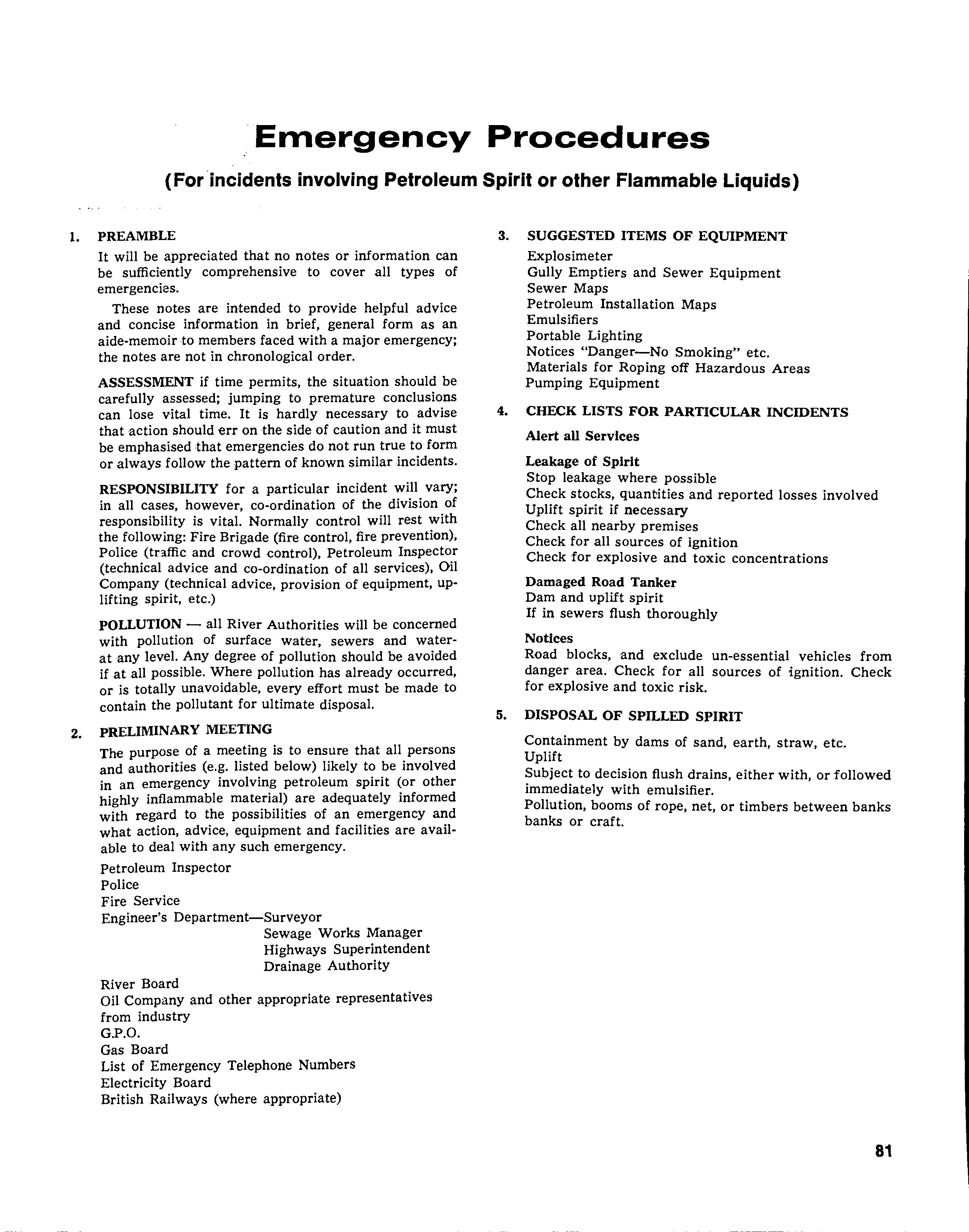
Petroleum Inspector police Fire Service Engineer's Department-Surveyor
Sewage Works Highways Superintendent Drainage Authority
3. SUGGESTED ITEMS OF EQUIPMENT
Explosimeter
Gully Emptiers and Sewer Equipment Sewer Maps Petroleum Installation Maps Emulsifiers
Portable Lighting Notices "Danger-No Smoking" etc. Materials for Roping off Hazardous Areas Pumping Equipment
4. CHECK LISTS FOR PARTICULAR INCIDENTS
Alert all Services
Leakage of Spirit Stop leakage where possible Check stocks, quantities and reported losses involved Uplift spirit if necessary Check all nearby premises Check for all sources of ignition Check for explosive and toxic concentrations
Damaged Road Tanker Dam and uplift spirit If in sewers flush thoroughly Notices Road blocks, and exclude un-essential vehicles from danger area. Check for all sources of ignition. Check for explosive and toxic risk.
5. DISPOSAL OF SPILLED SPIRIT
Containment by dams of sand, earth, straw, etc. Uplift
Subject to decision flush drains, either with, or followed immediately with emulsifier. Pollution, booms of rope, net, or timbers between banks banks or craft.
River Board
Oil Company and other appropriate representatives from industry G.P.O.
Gas Board
List of Emergency Telephone Numbers Electricity Board British Railways (where appropriate)
81
Subject I
PERIOD 1968-1972 (VOLUMES 7 to 11)
References indicate year and page numbers. All articles are not indexed but references to other articles may be found in those listed. The index, particularly in Volume 8 (October 1969), contains information prior to 1968.
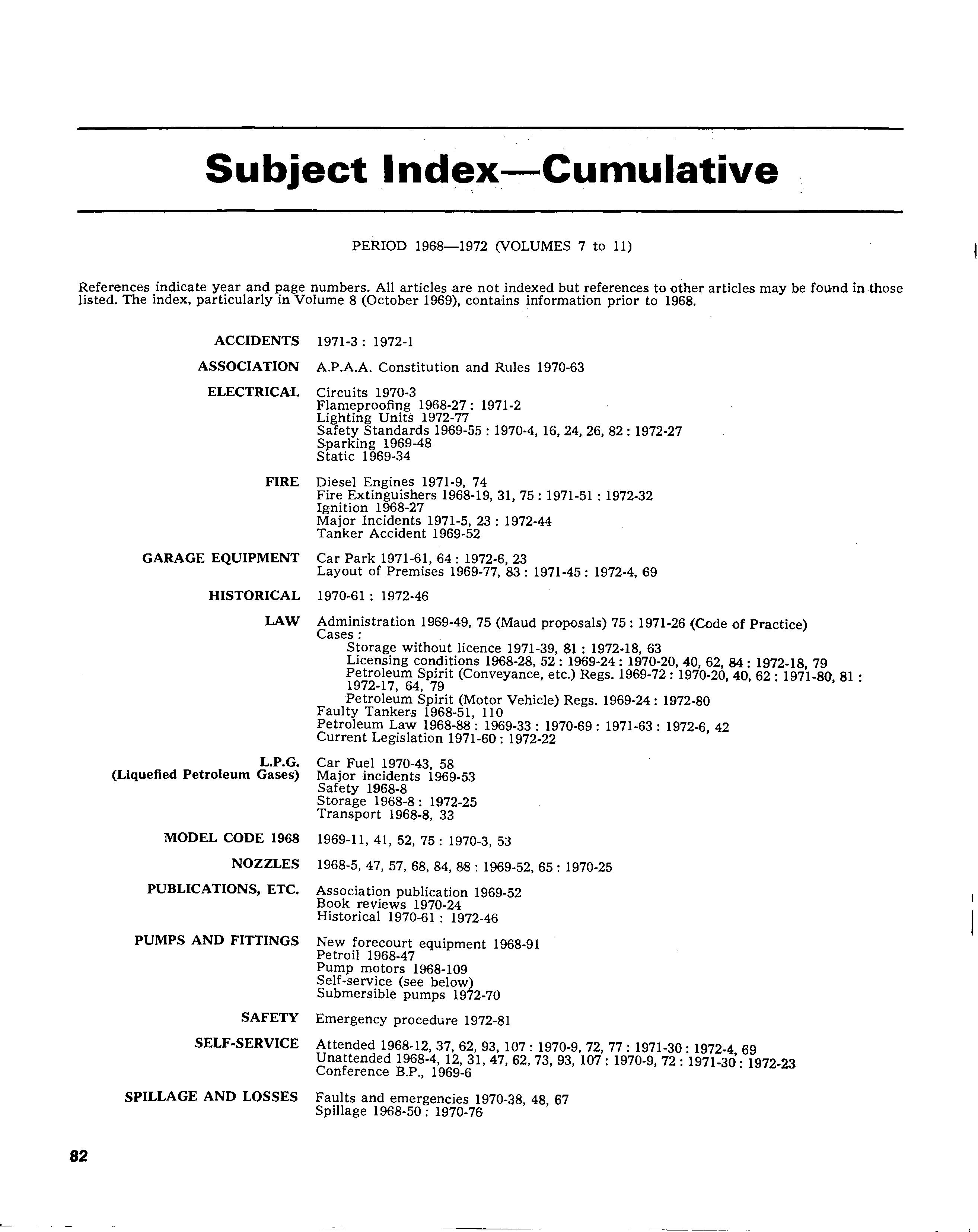
ACCIDENTS 1971-3: 1972-1
ASSOCIATION AP.AA Constitution and Rules 1970-63
ELECTRICAL Circuits 1970-3
Flameproofing 1968-27: 1971-2 Lighting Units 1972-77 Safety Standards 1969-55: 1970-4, 16,24,26,82: 1972-27 Sparking 1969-48 Static 1969-34
FIRE Diesel Engines 1971-9, 74
Fire Extinguishers 1968-19,31, 75: 1971-51 : 1972-32 Ignition 1968-27
Major Incidents 1971-5, 23: 1972-44 Tanker Accident 1969-52
GARAGE EQUIPMENT Car Park 1971-61, 64: 1972-6,23
HISTORICAL
LAW LP.G. (Liquefied Petroleum Gases)
Layout of Premises 1969-77, 83: 1971-45: 1972-4,69 1970-61: 1972-46
Administration 1969-49, 75 (Maud proposals) 75 : 1971-26 (Code of Practice) Cases: Storage without licence 1971-39, 81: 1972-18, 63 Licensing conditions 1968-28, 52: 1969-24: 1970-20, 40, 62, 84 : 1972-18, 79 Petroleum Spirit (Conveyance, etc.) Regs. 1969-72: 1970-20,40,62: 1971-80,81 : 1972-17, 64, 79
Petroleum Spirit (Motor Vehicle) Regs. 1969-24: 1972-80 Faulty Tanker,s 1968-51, 110 Petroleum Law 1968-88: 1969-33: 1970-69: 1971-63: 1972-6, 42 Current Legislation 1971-60: 1972-22
Car Fuel 1970-43, 58
Major ·incidents 1969-53 Safety 1968-8
MODEL CODE 1968 NOZZLES PUBLICATIONS, ETC.
PUMPS AND FITTINGS
Storage 1968·8: 1972-25 Transport 1968-8, 33 1969-11, 41, 52, 75 : 1970-3, 53 1968-5,47, 57,68,84,88 : 1969-52,65: 1970-25
Association publication 1969-52 Book reviews 1970-24
Historical 1970-61 : 1972-46
New forecourt equipment 1968-91
Petroil 1968-47
Pump motors 1968-109 Self-service (see below) Submersible pumps 1972-70
SAFETY
SELF-SERVICE
SPILLAGE AND LOSSES
Emergency procedure 1972-81
Attended 1968-12,37,62,93, 107: 1970-9,72,77: 1971-30: 1972-4,69 Unattended 1968-4, 12, 31, 47, 62, 73, 93, 107 : 1970-9, 72 : 1971-30: 1972-23 Conference B.P., 1969-6
Faults and emergencies 1970-38,48,67
Spillage 1968-50: 1970-76
82
STORAGE Airport storage 1969-5, 76
Boats 1968-39
Bulk stores 1968-41 : 1969-71 : 1970-6: 1971-26, 66
Can stores 1970-15
Content gauges 1969-88: 1971-81 : 1972-13
Disused tanks 1968-49: 1971-43, 46, 72 : 1972-14, 40, 47
Double tanks 1969-53
Filling 1968-72
Glass fibre tanks 1968-20: 1969-2,73,88: 1970-66: 1971-63,65: 1972-44,68
Leaking tanks 1971-57
Offset fillers 1968-49: 1969-70: 1972-17
Plastic storage tanks 1968-2, 20
Safe storage 1972-31
Tank cleansing 1971-24: 1972-47
Tank numbers 1968-43
Tank testing 1968-102, 105: 1971-35: 1972"61
Underground tanks 1969-77: 1970-45 Ventilation 1970-45
Vent pipe 1970-66: 1971-20, 58, 80
TECHNICAL: Flammability 1969-47, 48: 1971-43 FUEL AND CHEMISTRY
Flashpoint tester 1970-30
L.P.G. 1968-8
Nature of petroleum 1968-8, 98
Safety classification 1968-3
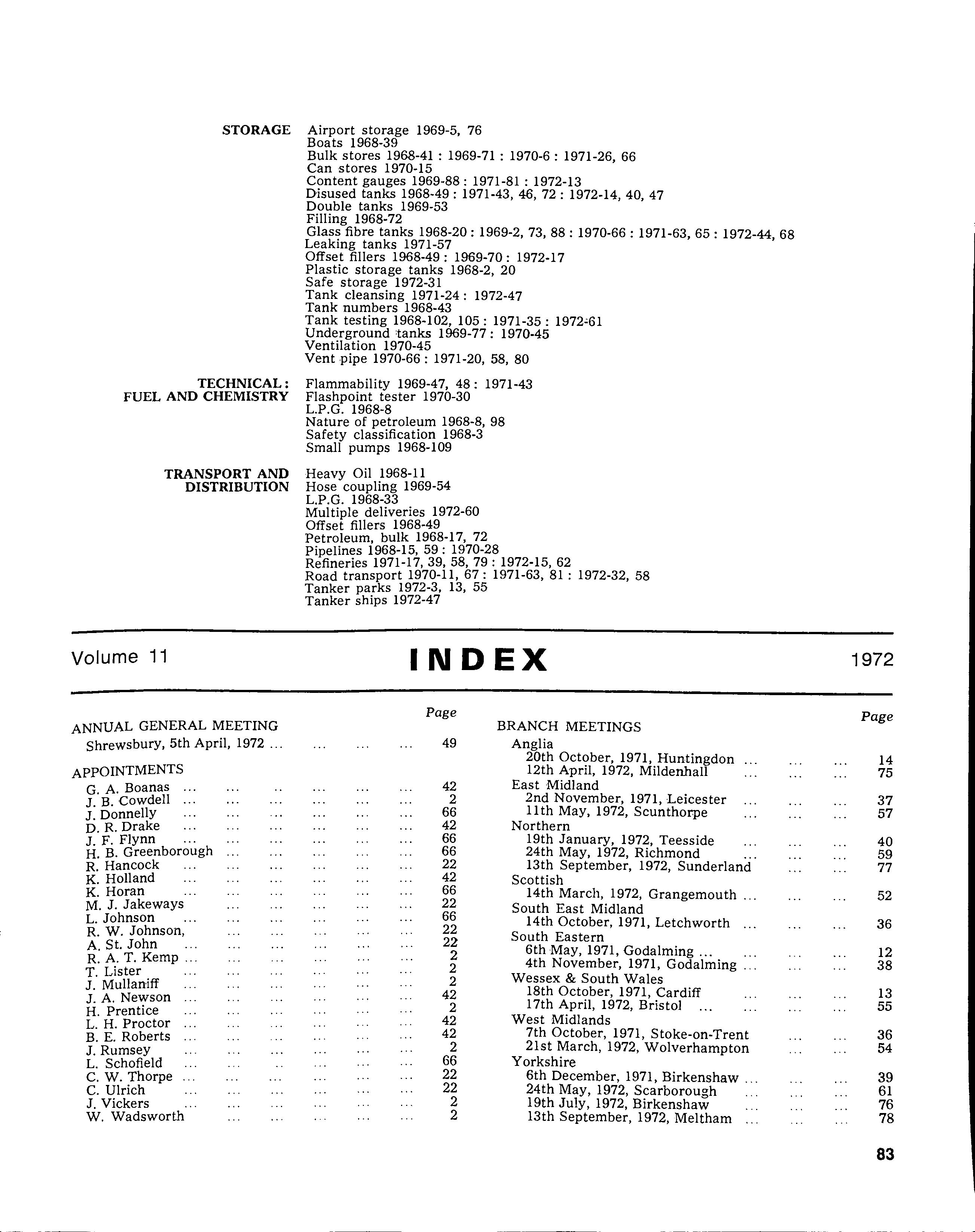
Small pumps 1968-109
TRANSPORT AND Heavy Oil 1968-11 DISTRIBUTION Hose coupling 1969-54 L.P.G. 1968-33
Multiple deliveries 1972-60
Offset fillers 1968-49 Petroleum, bulk 1968-17, 72 Pipelines 1968-15, 59: 1970-28 Refineries 1971-17, 39, 58, 79: 1972-15, 62 Road transport 1970-11, 67: 1971-63, 81 : 1972-32, 58 Tanker parks 1972-3, 13, 55 Tanker ships 1972-47
Volume 11
ANNUAL GENERAL MEETING
Shrewsbury, 5th April, 1972 ...
APPOINTMENTS
G. A. Boanas
J. B. Cowdell
J. Donnelly
D. R. Drake
J. F. Flynn
H. B. Greenborough
R. Hancock
K. Holland
K. Horan
M. J. Jakeways
L. Johnson
R. W. Johnson, A. St. John
R. A. T. Kemp
T. Lister
J. Mullaniff
J. A. Newson
H. Prentice
L. H. Proctor
B. E. Roberts
J. Rumsey
L. Schofield
C. W. Thorpe
C. Ulrich
J. Vickers W. Wadsworth
BRANCH MEETINGS
Anglia
20th October, 1971, Huntingdon 12th April, 1972, MildenhaU
East Midland 2nd November, 1971, Leicester 11th May, 1972, Scunthorpe
Northern 19th January, 1972, Teesside 24th May, 1972, Richmond ... 13th September, 1972, Sunderland
Scottish 14th March, 1972, Grangemouth
South East Midland 14th October, 1971, Letchworth
South Eastern 6th May, 1971, Godalming ... .. . 4th November, 1971, Godalming
Wessex & South Wales 18th October, 1971, Cardiff 17th April, 1972, Bristol
West Midlands 7th October, 1971, Stoke-on-Trent 21,st March, 1972, Wolverhampton
Yorkshire 6th December, 1971, Birkenshaw 24th May, 1972, Scarborough 19th July, 1972, Birkenshaw .. . 13th September, 1972, Meltham
INDEX Page 49 42 2 66 42 66 66 22 42 66 22 66 22 22 2 2 2 42 2 42 42 2 66 22 22 2 2
1972
14 75 37 57 40 59 77 52 36 12 38 13 55 36 54 39 61 76 78 83
Page
COUNCIL MEETINGS
Birmingham-15th September, 1971
Birmingham-26th January, 1972
Chester-1st June, 1972
EDITORIALS
Human Error
Where Are We Going Coming Your Way
The Reason Vllhy
LEGAL PROCEEDINGS
Page 10 34 72 1 21 41 65
Bognor Regis-Conveyance by Road Regulations 17
'Bradford-Storing without a licence, Motor Vehicles Regulations 18,6480
Cambridge-Conveyance by Road Regulations 40 Exeter-Conveyance Regulations and Licence Conditions 79
Godalming-Licence Conditions 80
Greater London Council----'Storing without a licence, Conveyance Regulations, and Bye Law infringements ... ... . .. ... 63
South East Derbyshire-Failing to make tanks permanently safe 18 Teesside-Storing without a licence 64
LETTERS
Application of Petroleum Legislation to Whisky, Gin, etc.-Sean P. Cunningham
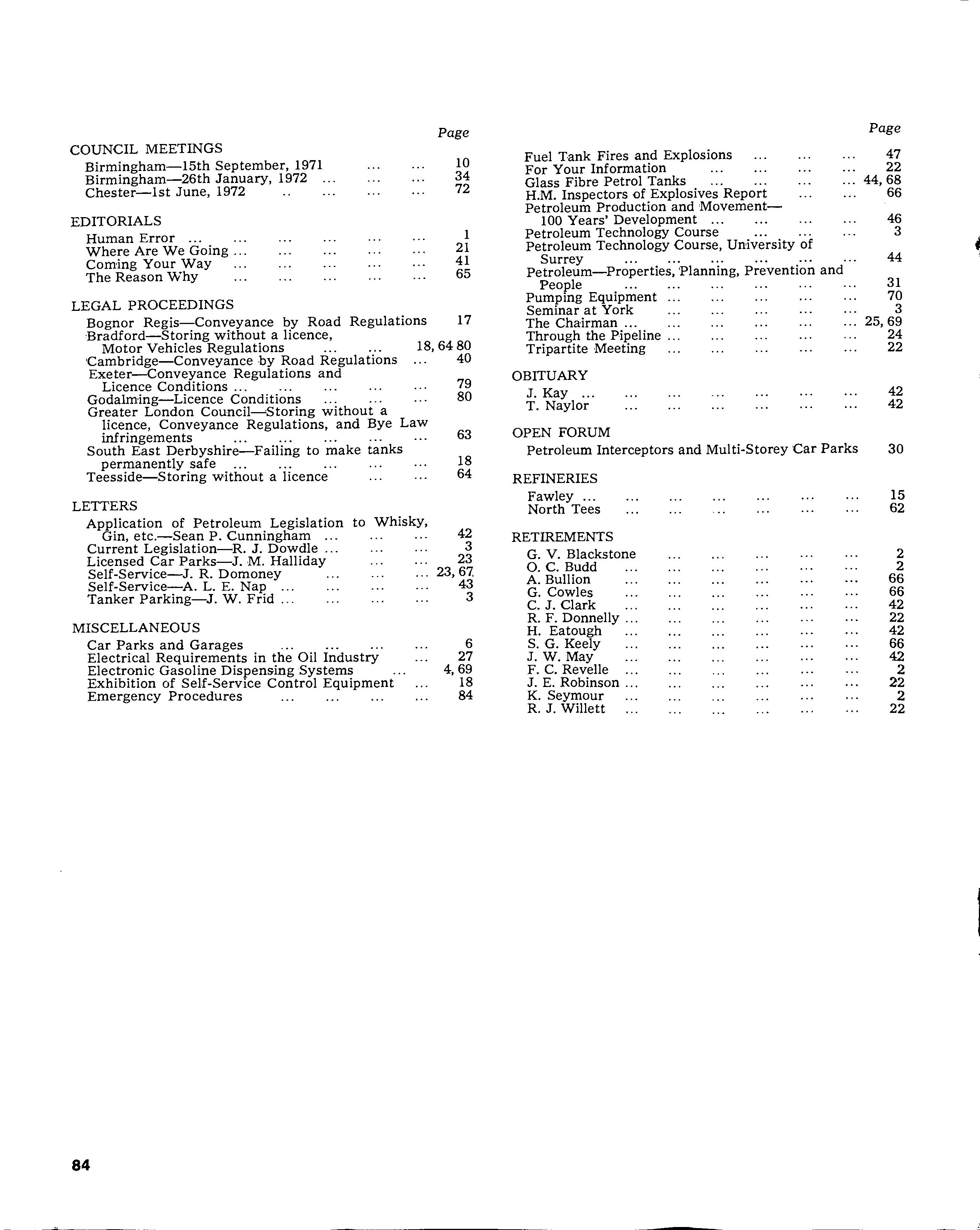
Current Legislation-R. J. Dowdle Licensed Car Parks-J. M. HaIIiday SeIf-Service-J. R. Domoney Self-Service-A. L. E. Nap .. . Tanker Parking-J. W. Frid
MISCELljANEOUS
Car Parks and Garages
Electrical Requirements in the Oil Industry Electronic Gasoline Dispensing Systems Exhibition of Self-Service Control Equipment Emergency Procedures
42 3 23 23,67, 43 3 6 27 4,69 18 84
Fuel Tank Fires and Explosions
For Your Information
Glass Fibre Petrol Tanks H.M. Inspectors of Explosives Report Petroleum Production and Movement100 Years' Development ... Petroleum Technology Course Petroleum Technology Course, University of Surrey... Petroleum-Properties, 'Planning, Prevention and People Pumping Equipment Seminar at York The Chairman .,. Through the P.ipeline Tripartite Meeting
OBITUARY
J. Kay T. Naylor
OPEN FORUM
Petroleum Interceptors and Multi-Storey Car Parks
REFINERIES
Fawley North Tees
RETIREMENTS G. V. Blackstone O.C.Budd A. Bullion G. Cowles C. J. Clark R. F. DonneIly H. Eatough S. G. Keely J. W. May F. C. ReveIle J. E. Robinson '" K. Seymour R. J. WiIlett
Page 47 22 44,68 66 46 3 44 31 70 3 25,69 24 22 42 42 30 15 62 2 2 66 66 42 22 42 66 42 2 22 2 22
84
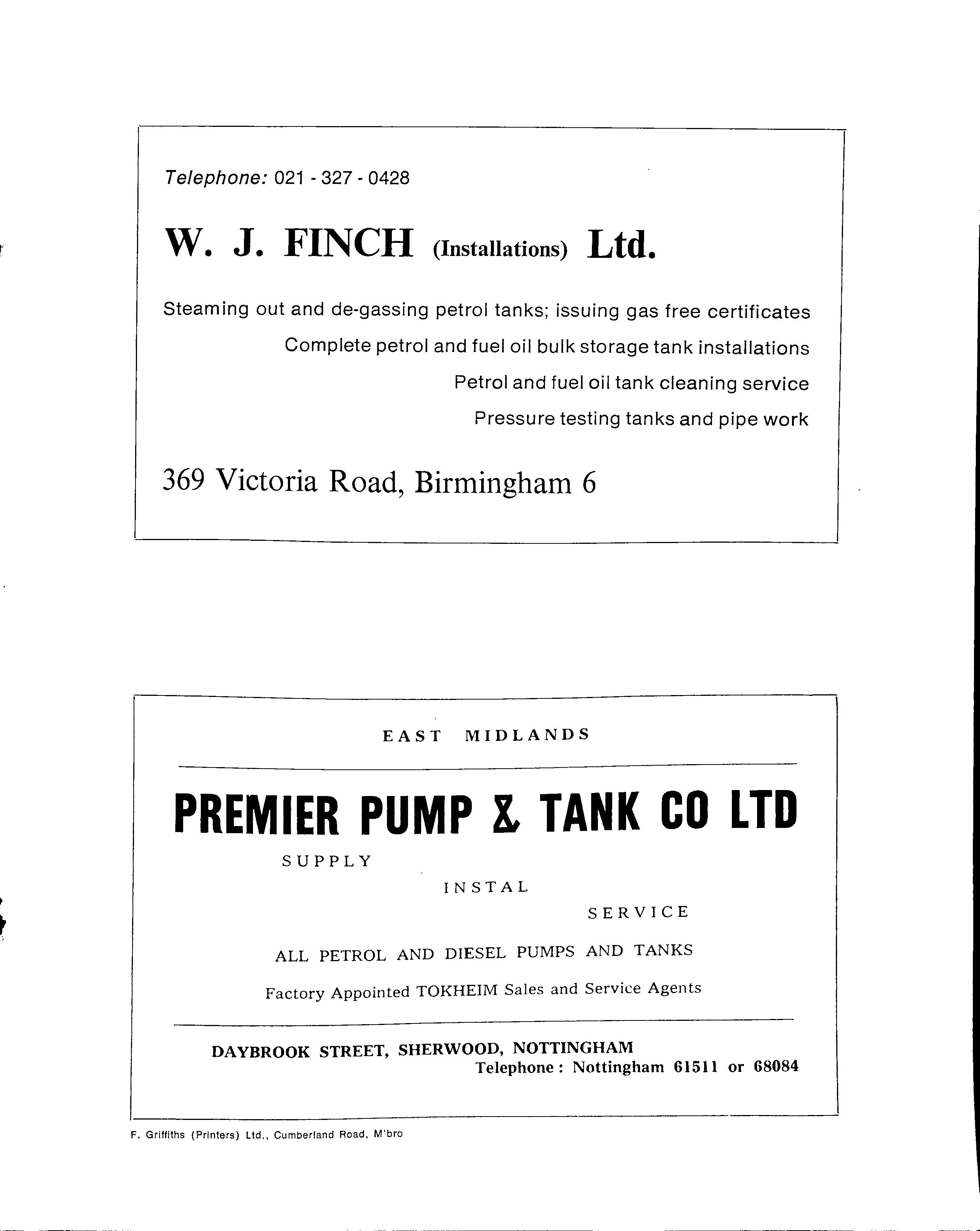
Telephone: 021 - 327 - 0428 w. J. FINCH (Installations) Ltd. Steam ing out and de-gassing petrol tanks; issuing gas free certificates Complete petrol and fuel oil bulk storage tank installations Petrol and fuel oil tank cleaning service Pressure testing tanks and pipe work 369 Victoria Road, Birmingham 6 EAST MIDLANDS PREMIER PUMP I, TANK CO LTD SUPPLY INSTAL SERVICE ALL PETROL AND DIESEL PUMPS AND TANKS Factory Appointed TOKHEIM Sales and Service Agents DAYBROOK STREET, SHERWOOD, NOTTINGHAM Telephone: Nottingham 61511 or 68084 F. Grlfflths (Printers) Ltd .• Cumberland Road, M'bro






 By A. D. Higgs, Esq., General Manager, Hunting Industrial Plastics Ltd.
By A. D. Higgs, Esq., General Manager, Hunting Industrial Plastics Ltd.
















